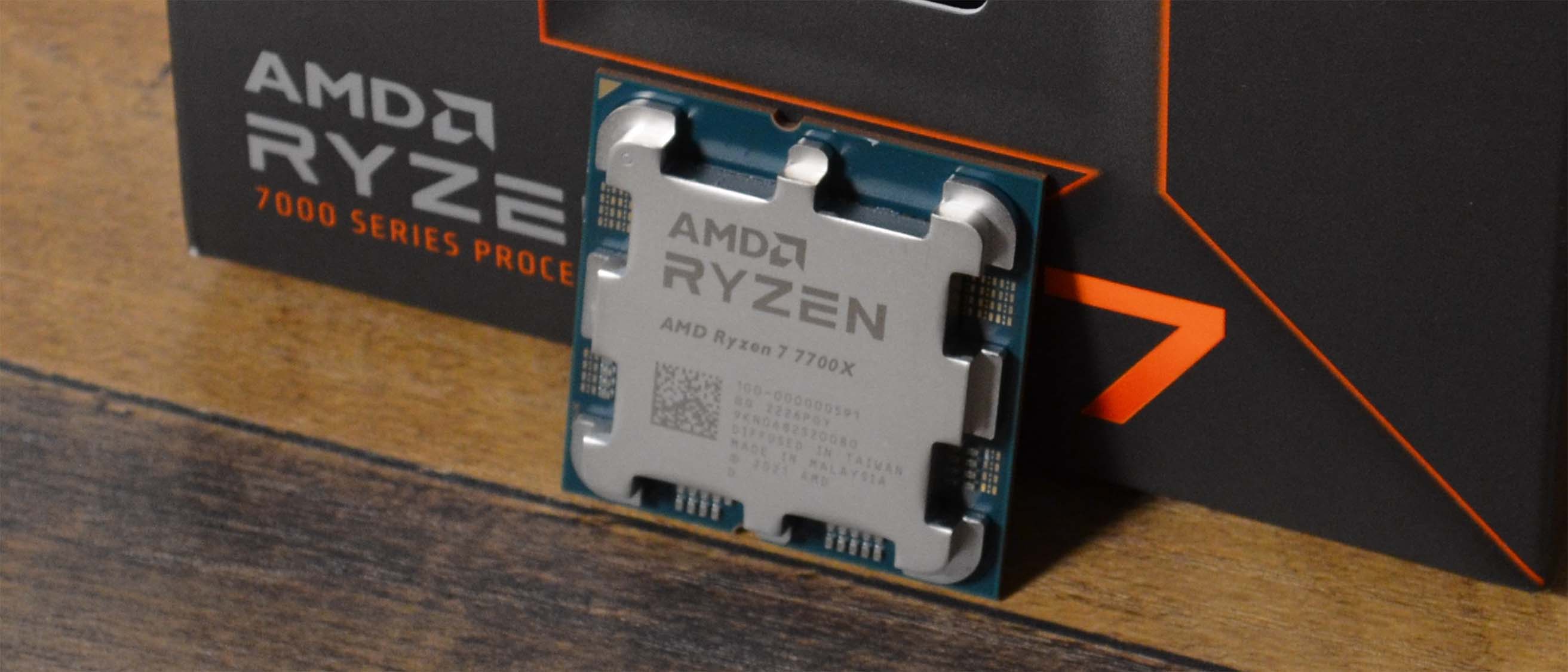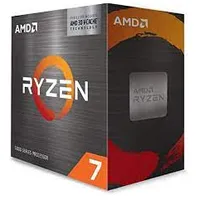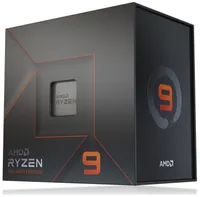TechRadar Verdict
The AMD Ryzen 7 7700X is hands down the best processor on the market for most people, especially if you're looking for phenomenal overall performance for the long term and at a great price. Just be prepared to spend more than the intial sticker price for the upgrade.
Pros
- +
Outstanding overall performance
- +
Accessible price point
- +
PCIe 5.0 and DDR5 for AMD systems
- +
Lower price than predecessor
Cons
- -
Requires a new motherboard
- -
No DDR4 compatibility, so new DDR5 is required
- -
Not the best for professional content creators
Why you can trust TechRadar
AMD Ryzen 7 7700X: Two minute review
When it comes to AMD processors, the Ryzen 9s get all the love that isn't lavished on Threadrippers, but you sleep on the AMD Ryzen 7 7700X at your peril, since it just might be the best AMD CPU ever produced for the masses.
The Ryzen 7000 series launch lineup includes the Ryzen 9 7950X, Ryzen 9 7900X, and Ryzen 5 7600X alongside the 7700X, but it's the 7700X the looks to hit the sweet spot between performance, price, and efficiency that puts it at the top of the product stack in our estimation.
Gen over gen, the only real competition the Ryzen 7 7700X has is the Ryzen 9 5950X, which has twice the processing cores of the 7700X. Still, the Ryzen 7 7700X all but buries it in terms of real world applications and gaming, while going the distance on multi-core-heavy content creation tasks, even if it can't outperform chips with twice the number of cores as itself.
But that's not to say the Ryzen 7 7700X isn't a fantastic prosumer processor for creatives, and photographers will especially want to see what the 7700X has to offer, as it runs Photoshop and Lightroom like a dream.
Video editors and 3D modelers will also find it has enough power to get the job done, and for those who might be working on a tighter budget, you can't argue with its very accessible price point for this kind of chip.
More than anything, gamers are going to want to check this chip out since it easily goes toe to toe with the best gaming processors on the market, the AMD Ryzen 7 5800X3D and the Intel Core i9-12900K, and comes out ahead overall and at a lower MSRP.
That MSRP doesn't tell the whole story though, since the Ryzen 7 7700X requires a whole new motherboard, and – unlike Intel Alder Lake chips – will also require you to buy DDR5 RAM, which at the moment is still pretty expensive, even as prices are coming down.
Sign up for breaking news, reviews, opinion, top tech deals, and more.
The move to the AM5 socket does bring with it PCIe 5.0 compatibility, so the Ryzen 7 7700X will be able to take advantage of both of these new technologies. Better still, the move to DDR5 also brings AMD EXPO, which is a one-click memory overclocking tech similar to Intel's XMP. The one technology we would like to have seen on the Ryzen 7 7700X is the company's 3D-VCache, which made the Ryzen 7 5800X3D such an excellent processor.
Even without this technology though, the move to TSMC's 5nm node has more than made up for it, as incredible clock speeds out of the box and unlocked overclocking means that enthusiast system builders who might not have the budget to shell out for the AMD Ryzen 9 7950X won't have to actually make all that much of a sacrifice by going with the Ryzen 7 7700X.
And for most people, the AMD Ryzen 7700X is simply the best AMD processor they are likely to see for years to come, and with the addition of DDR5 and PCIe 5.0, they'll be ready for whatever the future throws at them.
AMD Ryzen 7 7700X: Price & availability
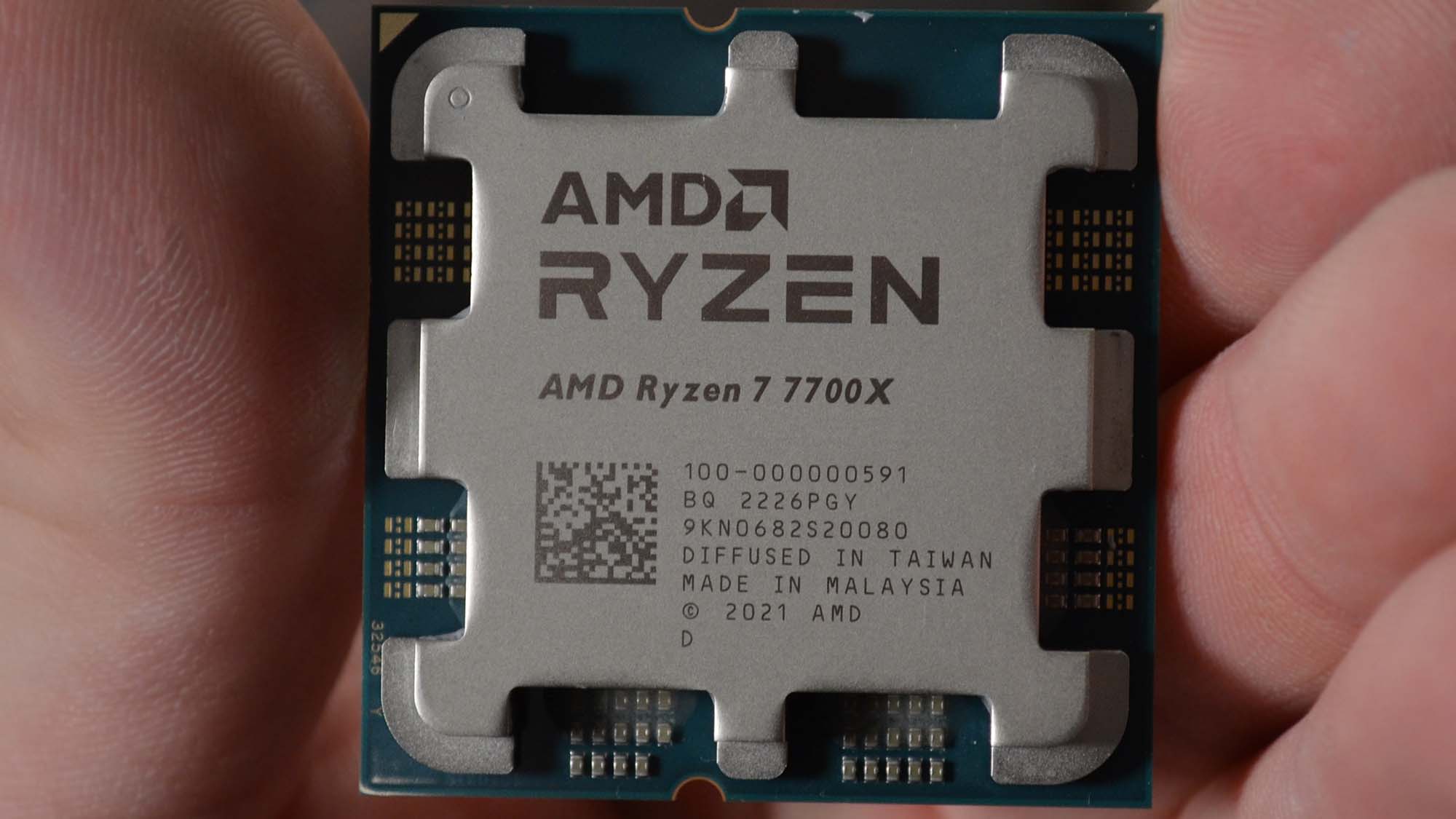
- How much does it cost? MSRP $399 (about £340 / AU$575)
- When is it available? September 27, 2022
- Where can you get it? Available in the US (UK and Australia dates forthcoming)
The AMD Ryzen 7 7700X is available as of September 27, 2022, for $399 in the US. It will be available in the UK and Australia as well, though we don't have exact pricing or availability at the time of this review. We have reached out to AMD for clarification, and we'll update this review when we hear back. It should sell for around £340 in the UK and AU$575.
There was no AMD Ryzen 7 5700X, so an exact comparison against its predecessor is difficult, especially since the AMD Ryzen 7 5700G was an APU, so it had a very different architectural aim. That said, the AMD Ryzen 7 5800X retailed for $449, and the AMD Ryzen 5 5600X retailed for $299, so the Ryzen 7 7700X slots in fairly well between these two.
Compared to the Intel Core i7-12700K, the Ryzen 7 7700X is about $10 cheaper (or about $20 more expensive than the i7-12700KF variant), and while we never did an explicit Core i7-12700K review, comparing it to the Intel Core i9-12900K, you can get very competitive performance with the Ryzen 7 7700X against Intel's best processor for nearly $190 less – and that's even considering the new AM5 motherboard and DDR5 you'll need to buy.
Both AMD Zen 4 and Intel Alder Lake will require investment in a lot of new hardware, so the extra savings on the Ryzen 7 7700X gives it a definite advantage, but how long this will hold once Intel Raptor Lake is released later this year remains to be seen. That said, everyone is expecting Intel's Raptor Lake chips to sell for more than their relevant Alder Lake counterparts, so AMD's value advantage here might widen further in the weeks and months ahead.
- Value: 4.5 / 5
AMD Ryzen 7 7700X: Chipset & features
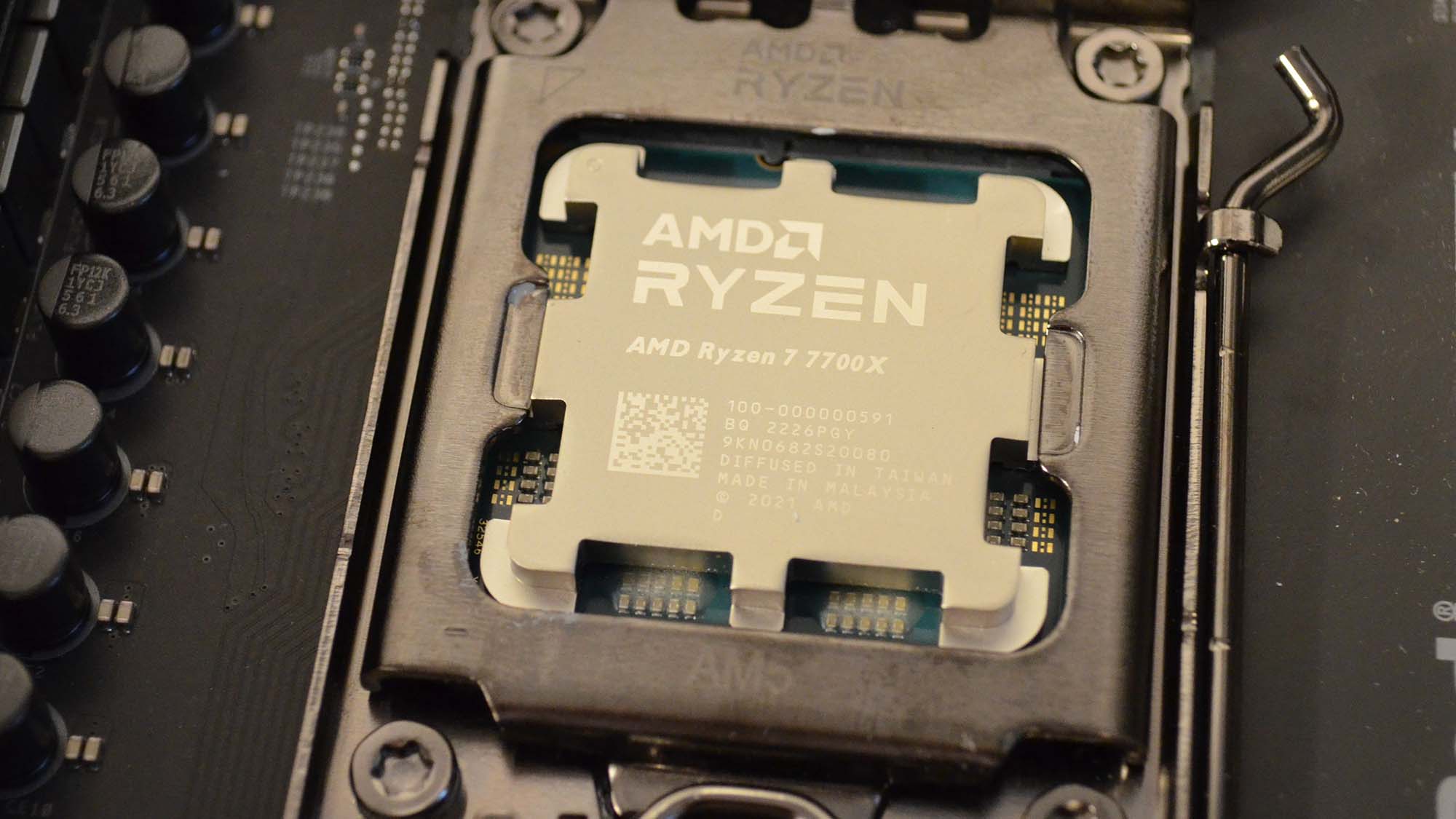
- PCIe 5.0 and DDR5 come to Ryzen chips
- Significantly faster clock speeds and 5nm architecture
- No 3D-VCache
Process: 5nm
Socket: AM5
Cores: 8
Threads: 16
Base frequency: 4.5GHz
Boost frequency: 5.4GHz
L3 cache: 40MB
TDP: 105W
PCIe: 5.0
Max RAM: 128GB Dual-Channel DDR5
Unlocked: Yes
Integrated Graphics: 2-core RDNA 2 GPU
The eight-core, 16-thread AMD Ryzen 7 7700X is among the first AMD Zen 4 processors to launch, featuring Team Red's next-generation 5nm architecture along with PCIe 5.0 and DDR5 RAM support.
These latter two features bring AMD into line with Intel, which released its initial Alder Lake lineup in November 2021. Unfortunately, the new Ryzen 7000-series doesn't include DDR4 RAM compatibility, which Alder Lake chips still support, as will the 13th-generation Intel Raptor Lake.
You do, however, get TSMC's new 5nm FinFET and significantly increased clock speeds for faster, more efficient cores. There was no Ryzen 7 5700X, so the nearest comparable predecessor was the eight-core, 16-thread AMD Ryzen 7 5800X, which had a base clock of 3.80 GHz and a boost clock of 4.70 GHz.
The Ryzen 7 7700X meanwhile has a base clock of 4.50 GHz and a boost clock of 5.40 GHz, which is a base clock increase of just over 18% and a nearly 15% increase in boost clock speed. This also puts the 7700X's base clock nearly within striking distance of the boost clock of the AMD Ryzen 9 5950X (4.90 GHz).
And while the Ryzen 7 7700X doesn't come with 3D-VCache like the AMD Ryzen 7 5800X3D, it still features 8MB more L3 Cache (40MB total) than the 5800X's 32MB, or a 25% L3 cache boost.
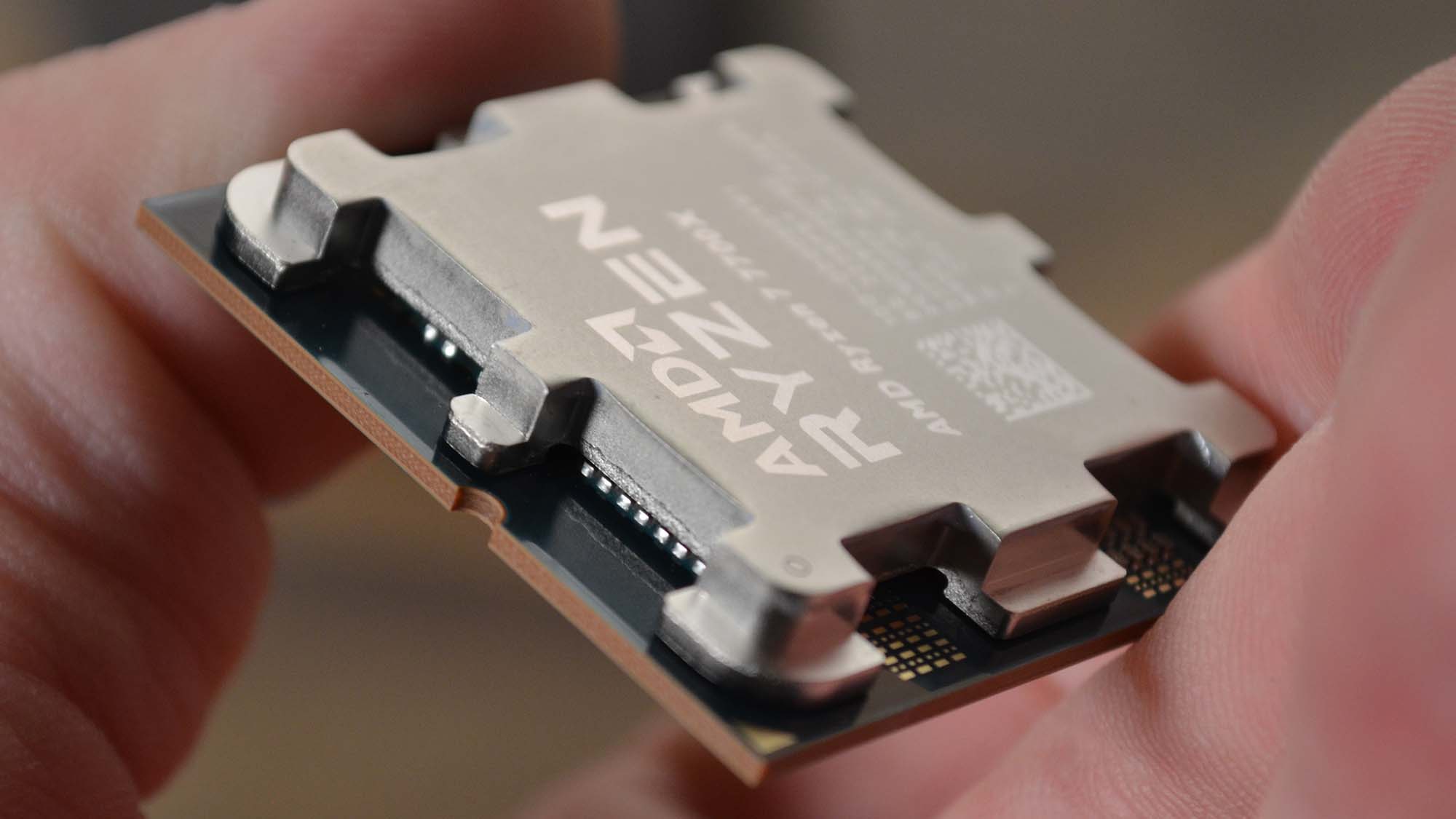
Looking over at the big.LITTLE design of the 10nm i7-12700K, you have eight performance cores (P-cores) with a total of 16 threads and four efficiency cores (E-cores), with one thread each, so the Ryzen 7 7700X is at a slight thread disadvantage.
The i7-12700K's core clocks are also significantly "slower", with its P-core base clock at 3.60 GHz and its boost clock hitting 4.9GHz. It's E-core base clock runs at 2.70GHz, boostable to 3.80GHz. All Ryzen 7 7700X cores are performance cores, so even though its base clock is 25% faster than that of the i7-12700K's P-cores and its boost clock running just over 10% faster than the i7-12700K's P-cores, Intel's chips still have a slight advantage thanks to its E-cores managing background tasks that can bog down the Ryzen 7 7700X's cores.
On top of that, the Ryzen 7 7700X has a lower TDP (105W) than the i7-12700K (125W), so it doesn't have nearly as much raw power flowing through it, which makes its performance all the more impressive owing to it also being a more efficient processor, but more on that in a bit.
Finally, it does have to be noted that the die housing and connectors have changed (no more bendable pins!), and the "feet" of the housing can get gunked up with thermal paste if you're not careful.
Fortunately, you really shouldn't have much trouble with this after you slot the chip into your new board and slap your old AM4 cooler on it, since AMD uses the same hardware for securing a cooler to the chip as it did with AM4. You might have to buy new RAM, but at least you don't have to go shopping for a new CPU cooler if you are upgrading from an AM4 chip (assuming the cooler can handle the increased thermal load, that is).
- Features: 5 / 5
AMD Ryzen 7 7700X: Performance
- Outstanding gaming performance
- Sizeable overall performance jump, gen-over-gen
- Integrated 2-core RDNA 2 GPU
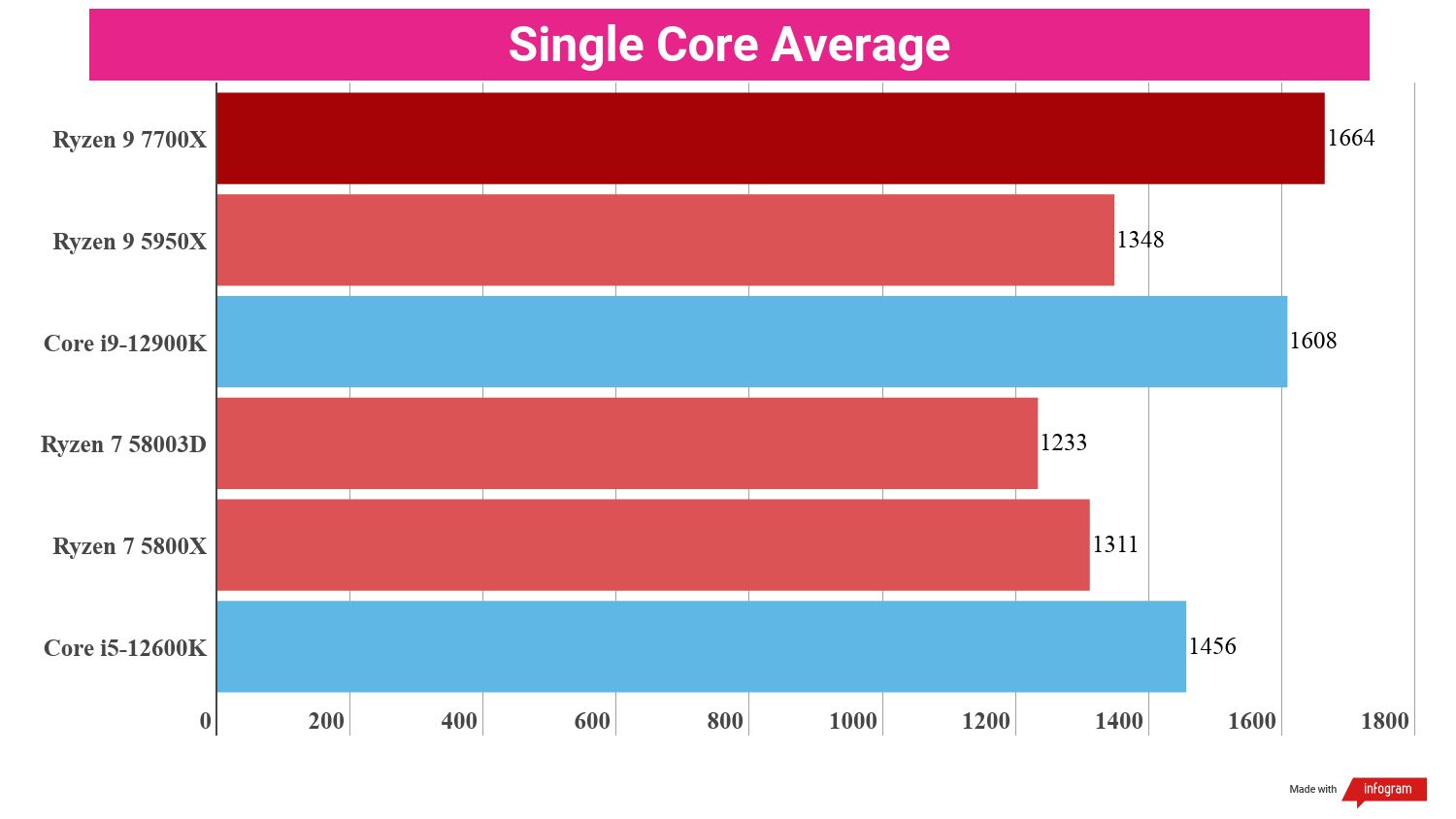
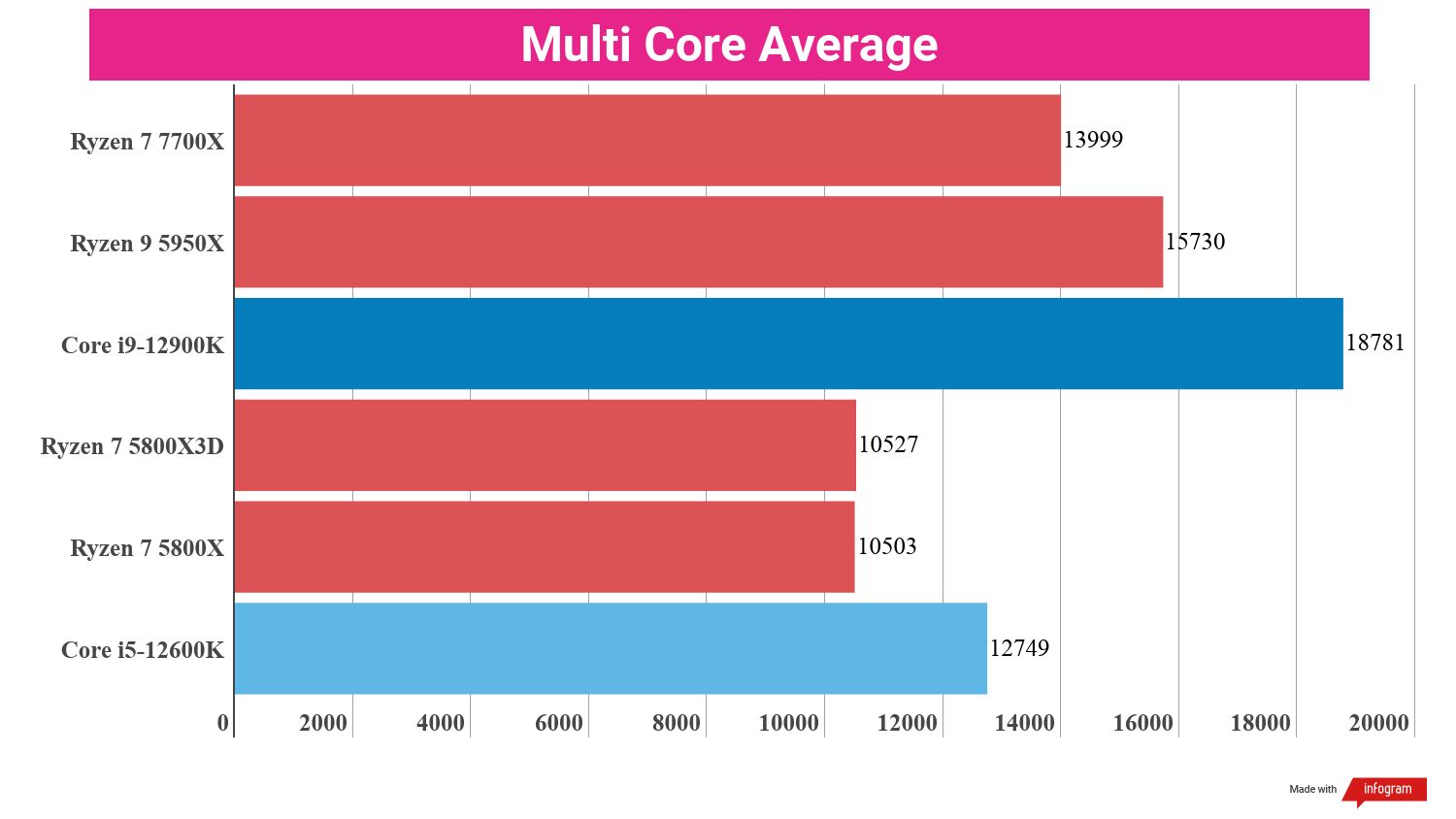
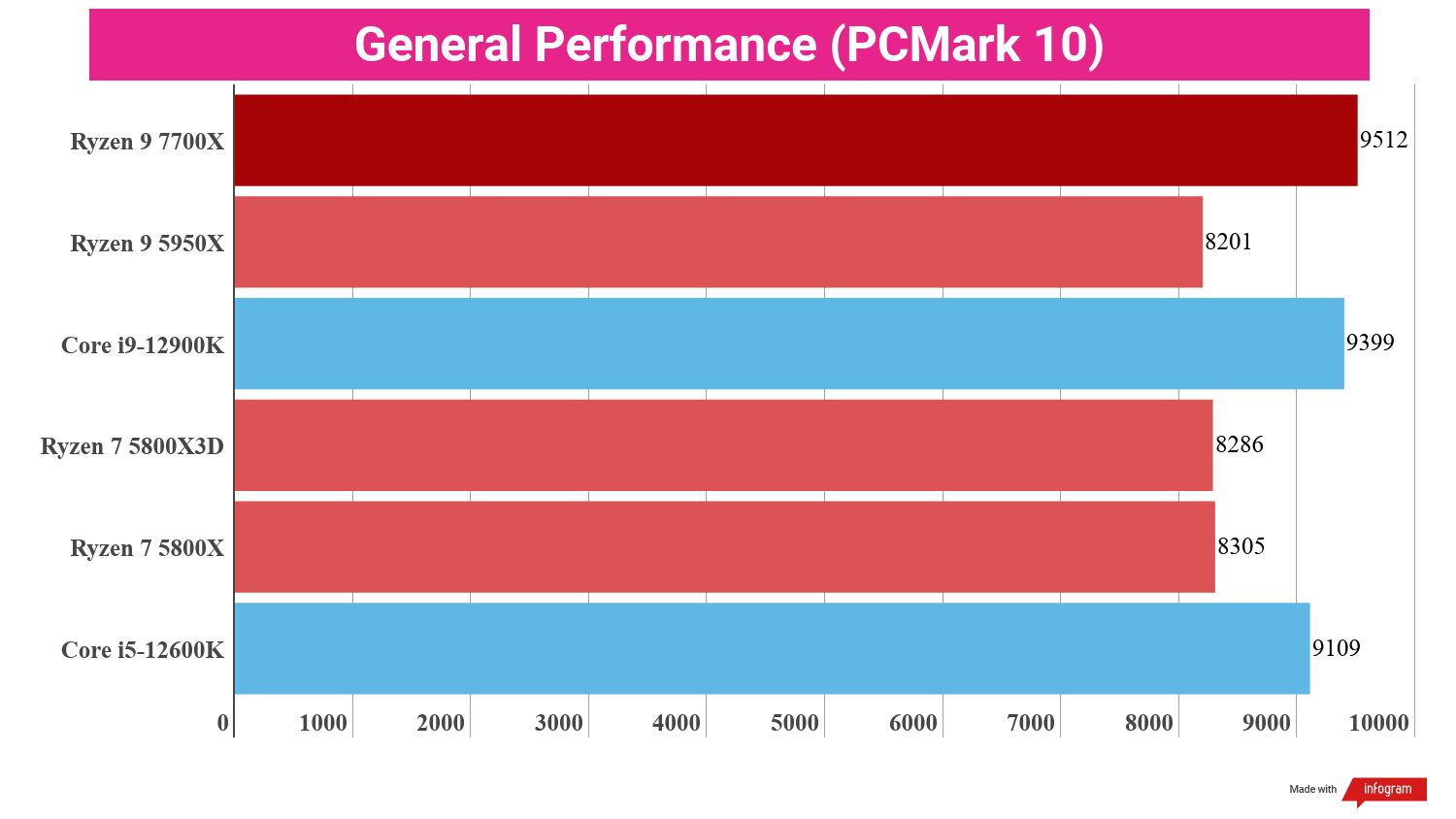
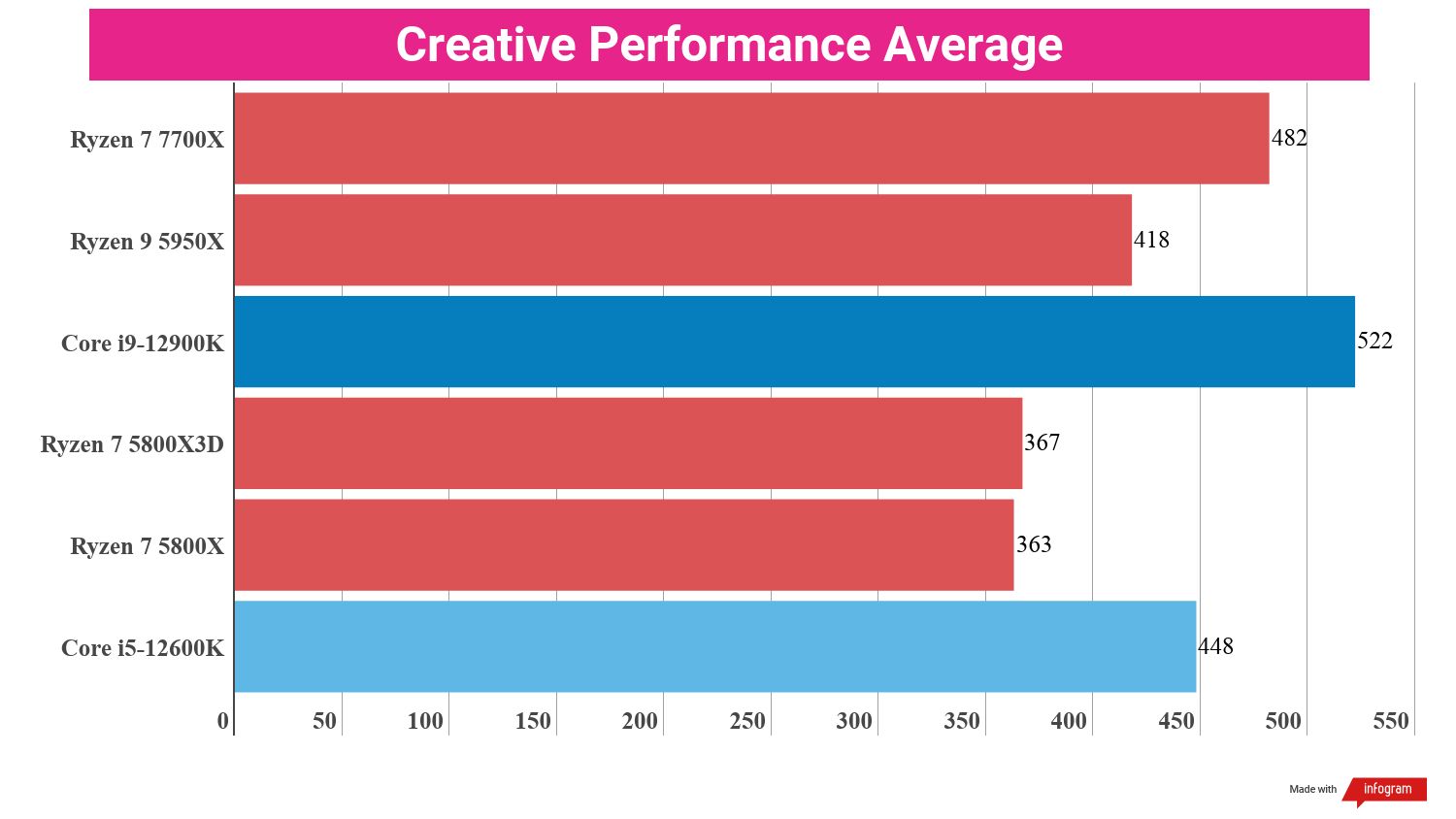
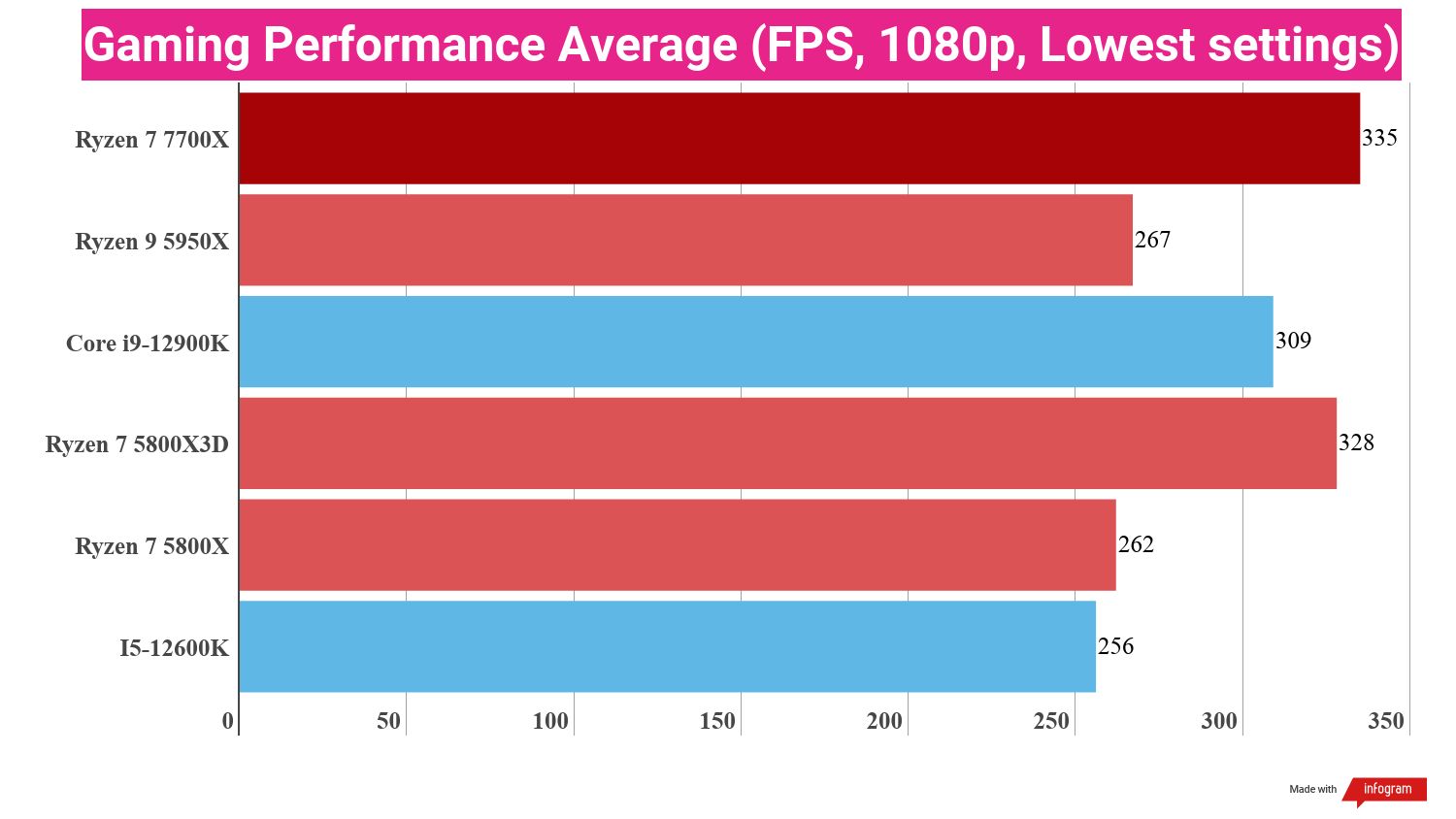
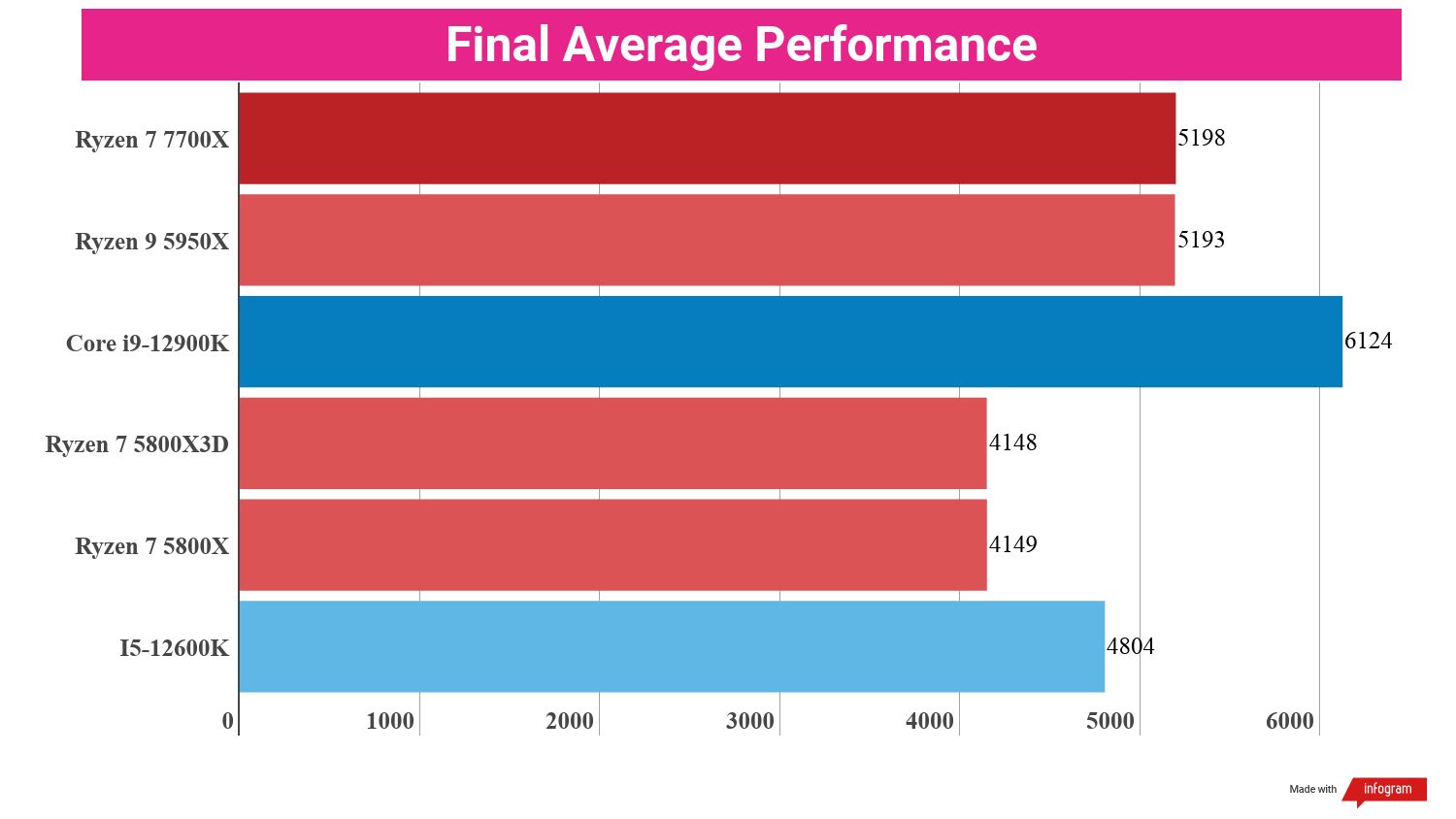
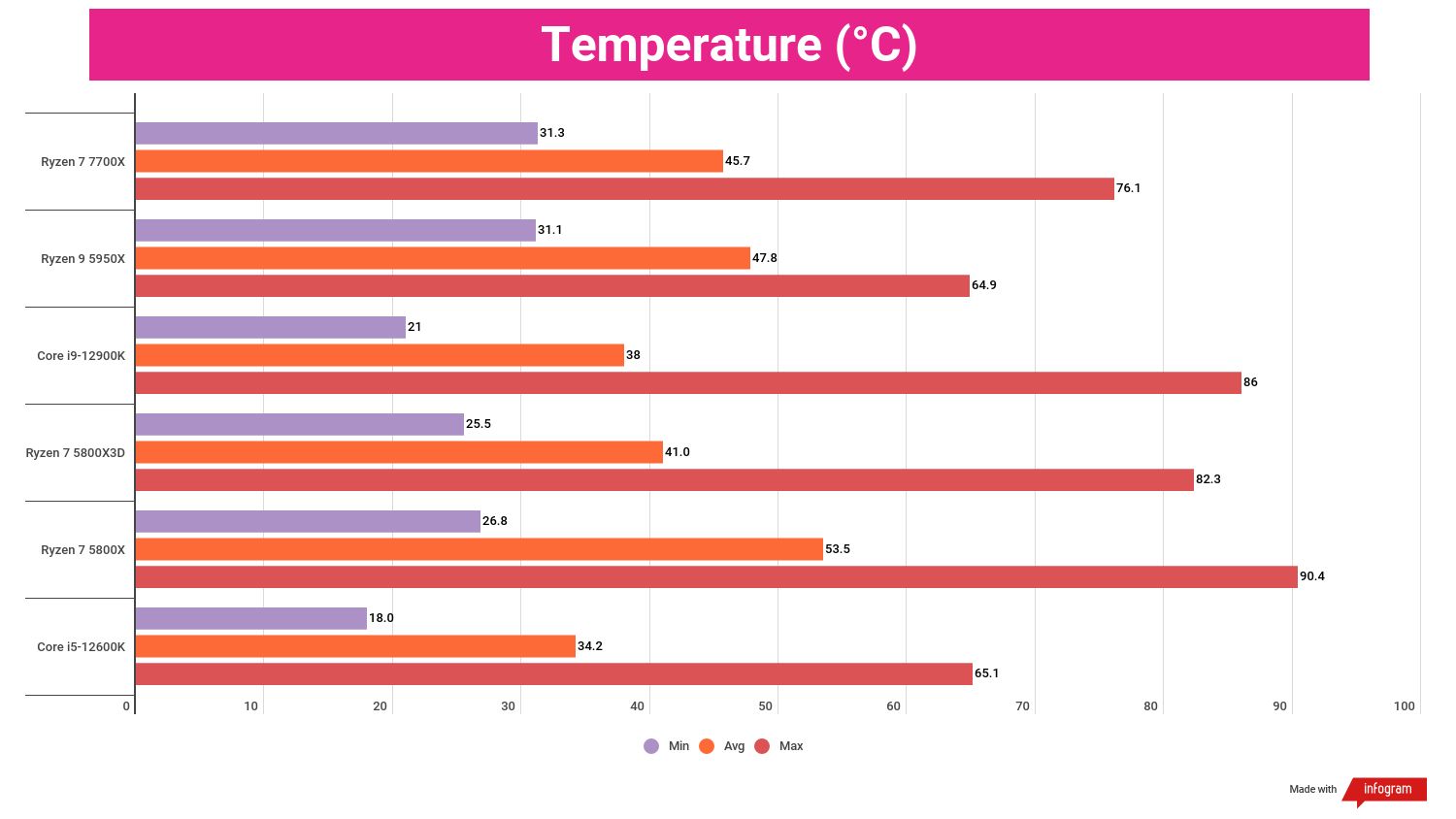
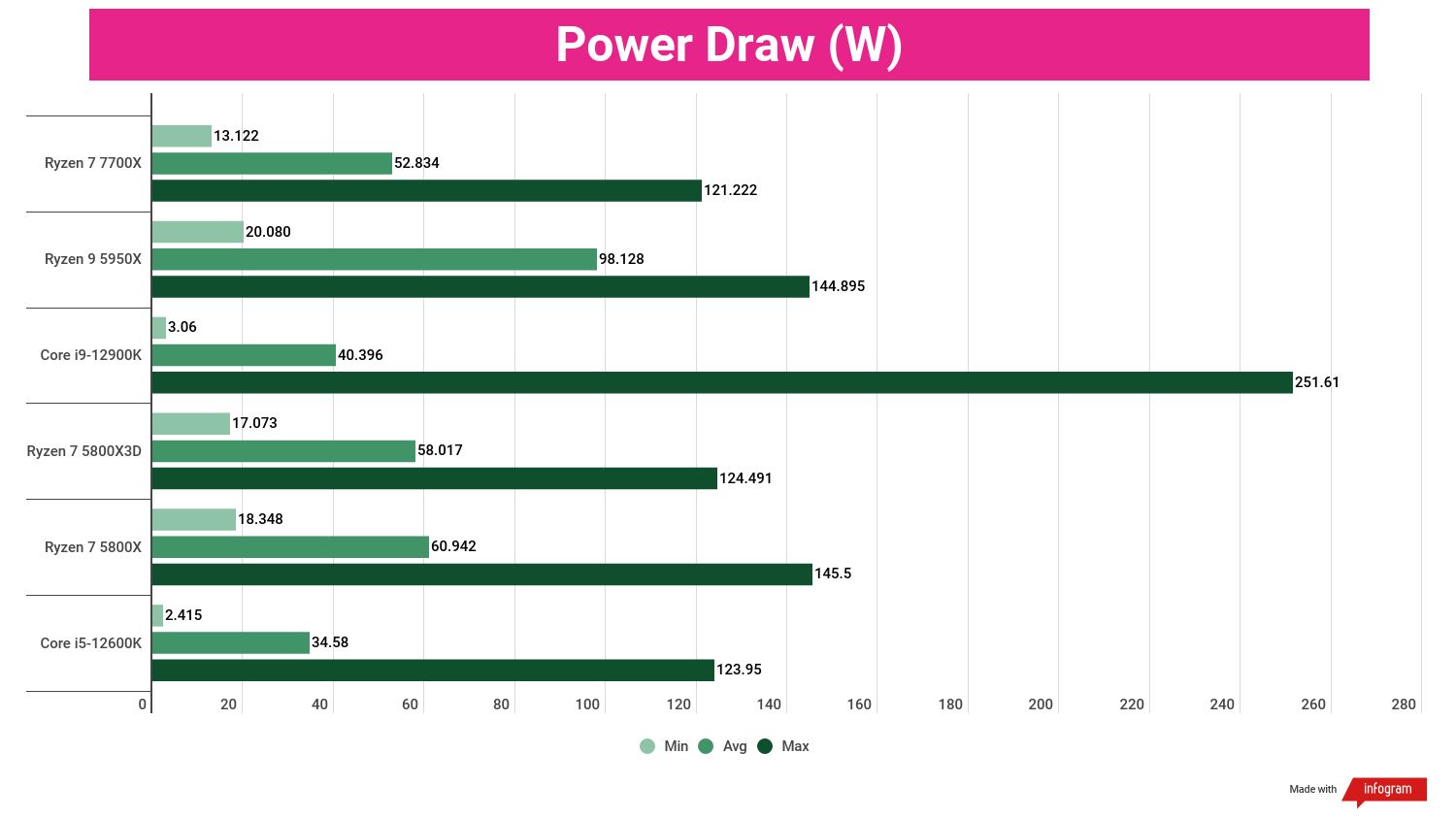
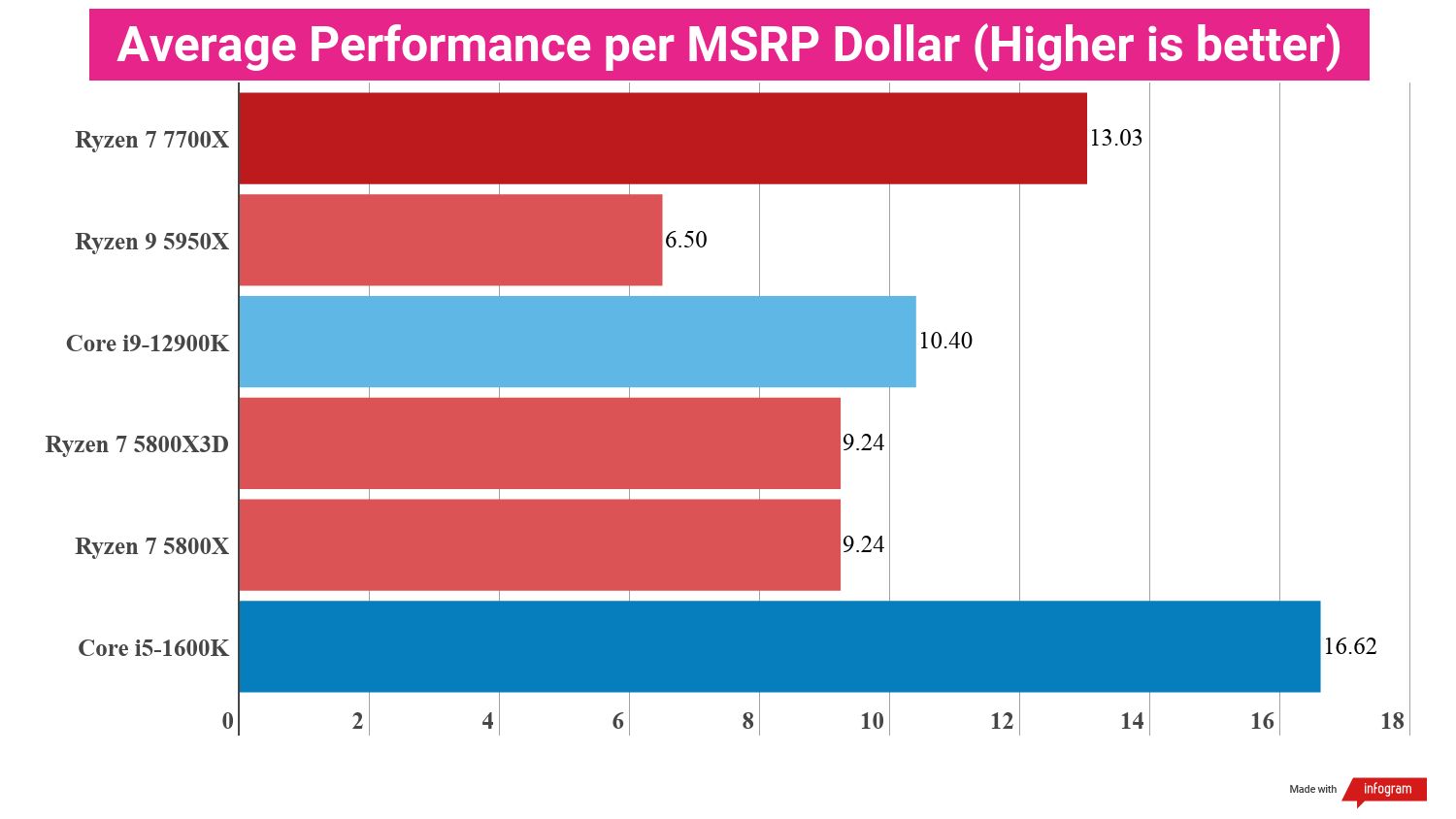
The AMD Ryzen 7 7700X is a substantial leap over all of the Ryzen 5000-series processors that preceded it, and essentially delivers comparable performance to the Ryzen 9 5950X when averaged over all benchmarks. Whether its raw single-core or multi-core performance, real-world use, content creation, or gaming performance, the Ryzen 7 7700X brushes aside pretty much every other processor on the market we've tested that isn't the Core i9-12900K or the Ryzen 9 7950X.
On specific benchmarks, it might fall behind the Core i9-12900K – which was the best processor on the market until the Ryzen 9 7950X came along – or the Ryzen 7 5800X3D, which was the best gaming processor around until the Ryzen 7 7700X took the lead (for now).
And this does include the Ryzen 9 7950X, which scored just behind the Ryzen 7 7700X, on average, in our tests. We've yet to test the Ryzen 9 7900X, so this might change in a few weeks, but with an MSRP $50 less than the Ryzen 7 5800X3D, this is definitely the processor to consider when looking for a new gaming CPU.
The 7700X only really gets completely blown out by the i9-12900K in terms of raw multi-core performance, which was a fight an eight-core, 16-thread processor could never win against a 16-core/24-thread chip in just one generation.
Still, across all categories, the Ryzen 7 7700X is consistently in the mix on most benchmarks, even if it isn't always winning. But there are still plenty of surprises from this CPU, including a 25.28% improvement in overall performance against the Ryzen 7 5800X, and a 35.39% increase over the AMD Ryzen 7 5700G.
This latter chip is comparable to the Ryzen 7 7700X in that it has an integrated GPU, unlike the Ryzen 7 5700X, but it has a much 40W lower TDP (65W against 105W) and half the L3 cache, so the 5700G really never stood a chance here.
Interestingly, the Ryzen 7 7700X scores 15.12% lower than the Core i9-12900K overall, but this makes up half the ground of the Ryzen 7 5800X's 32.25% overall performance shortfall against the same chip.
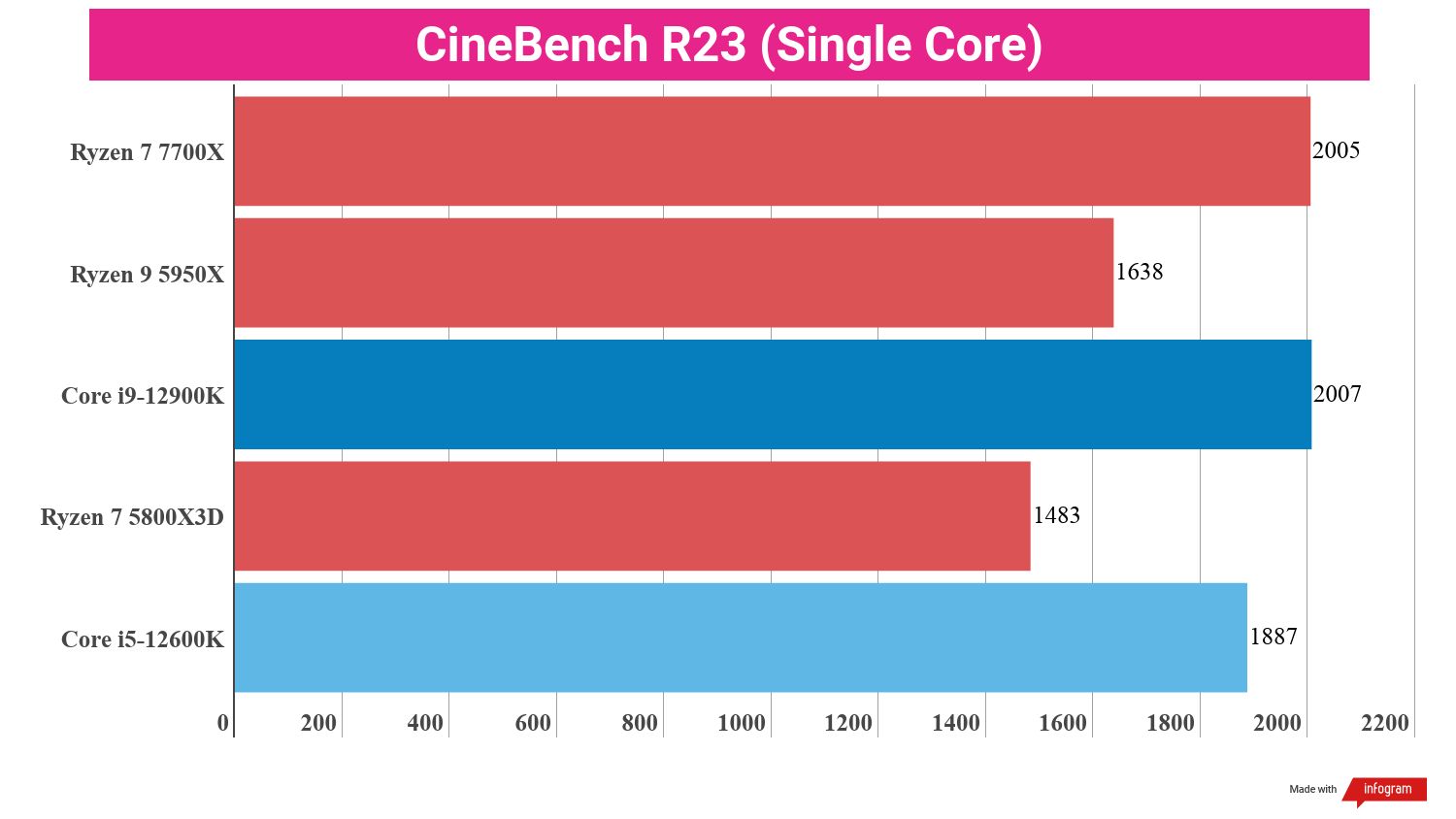
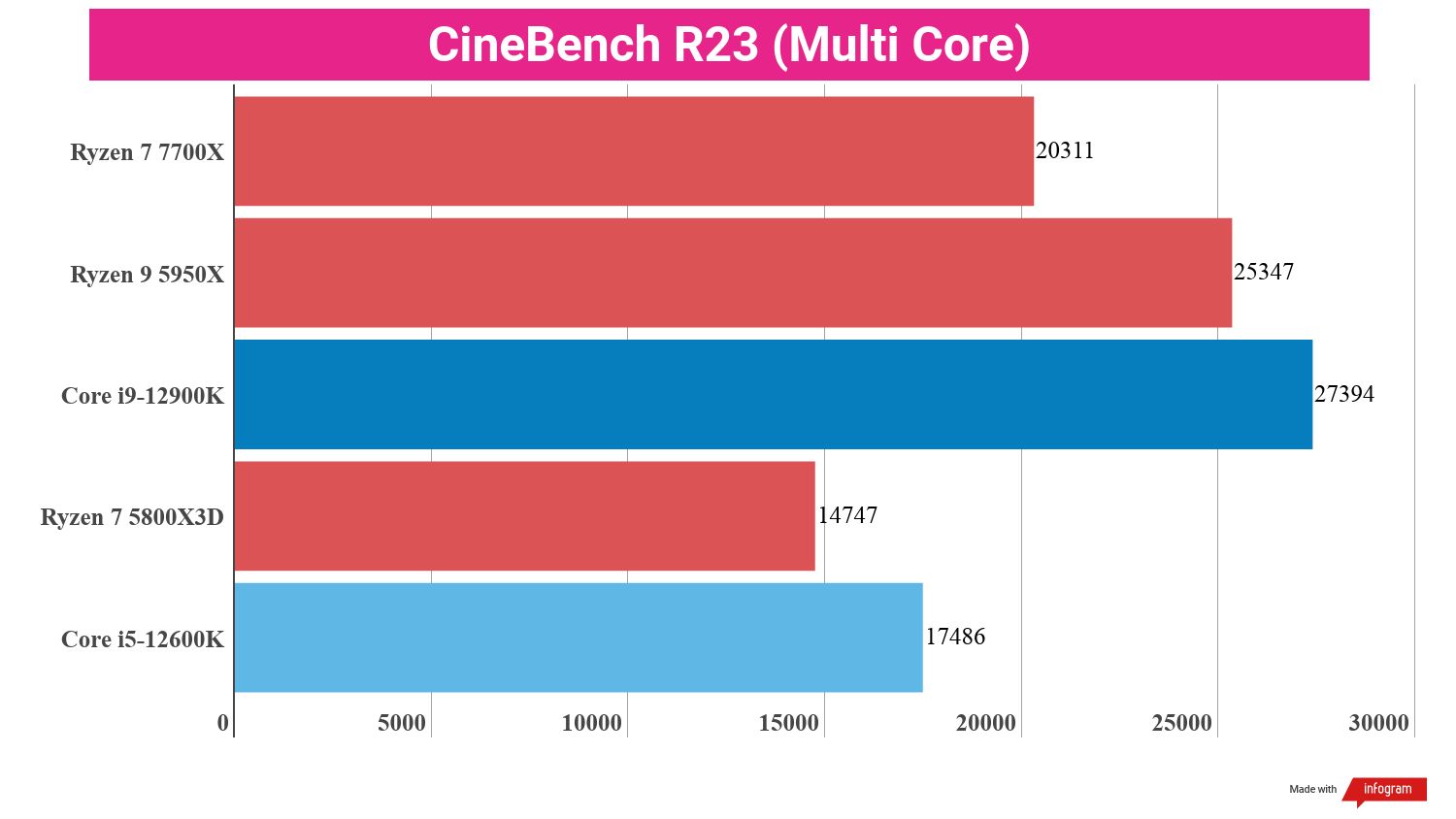
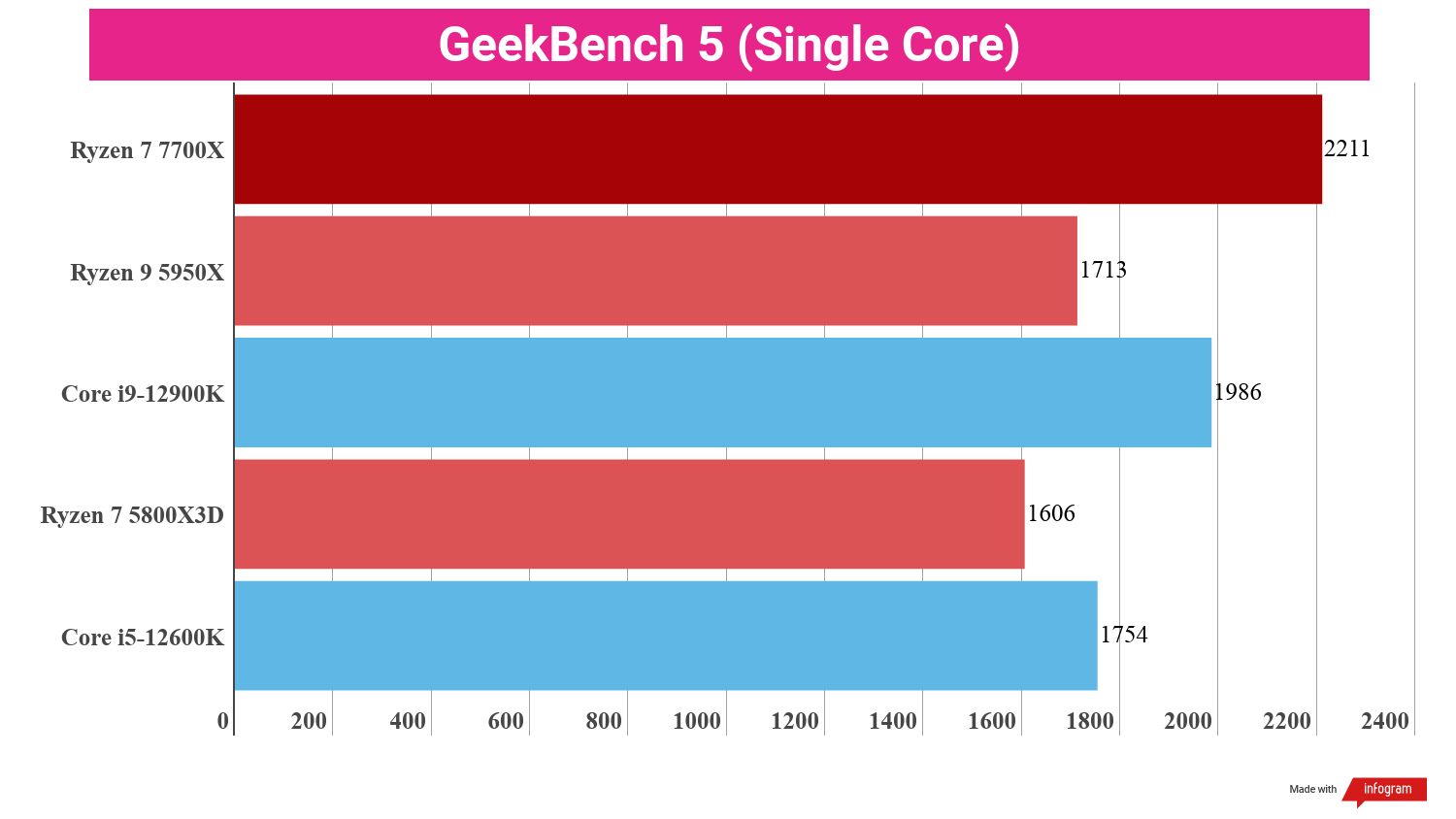
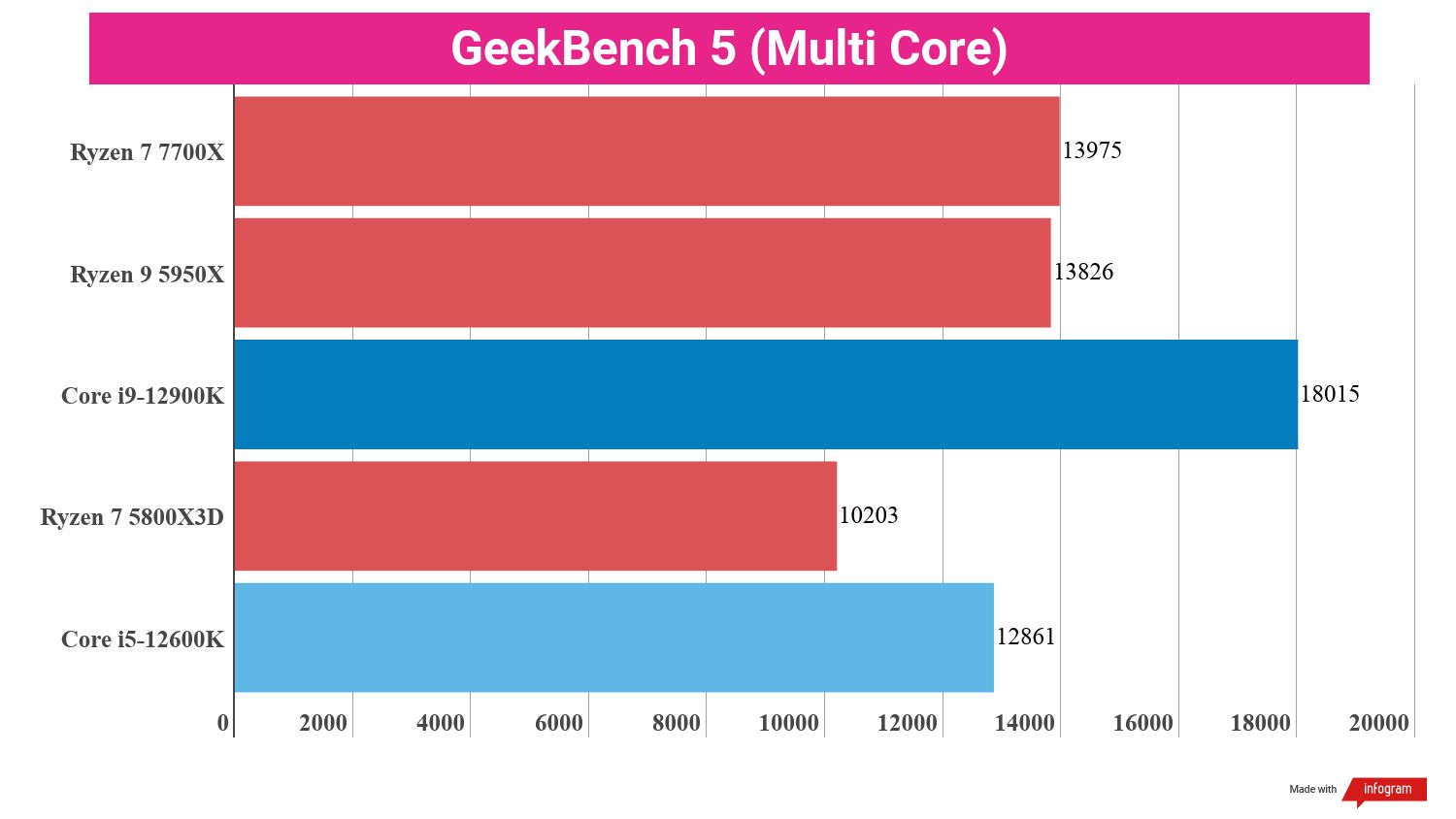
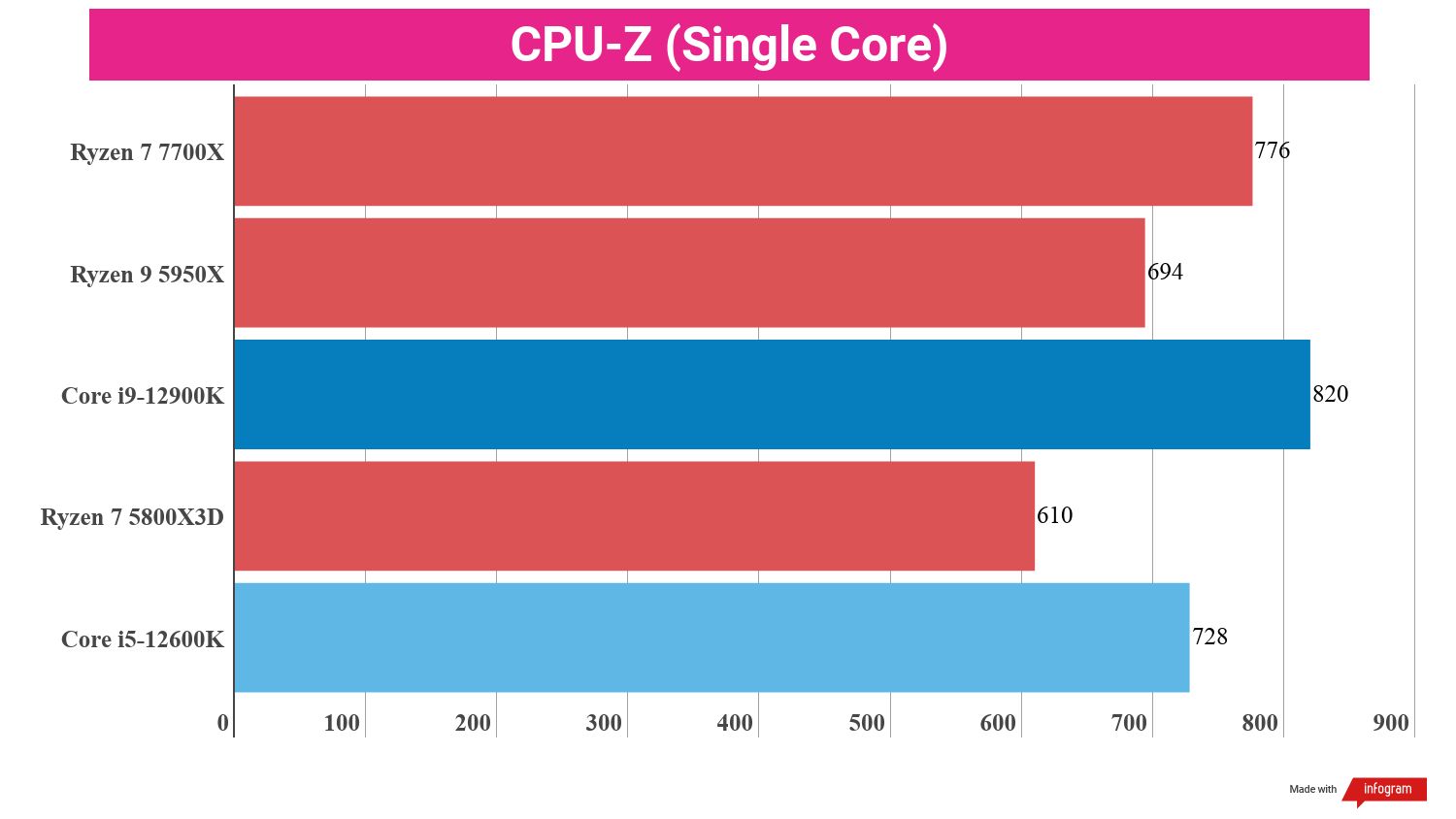
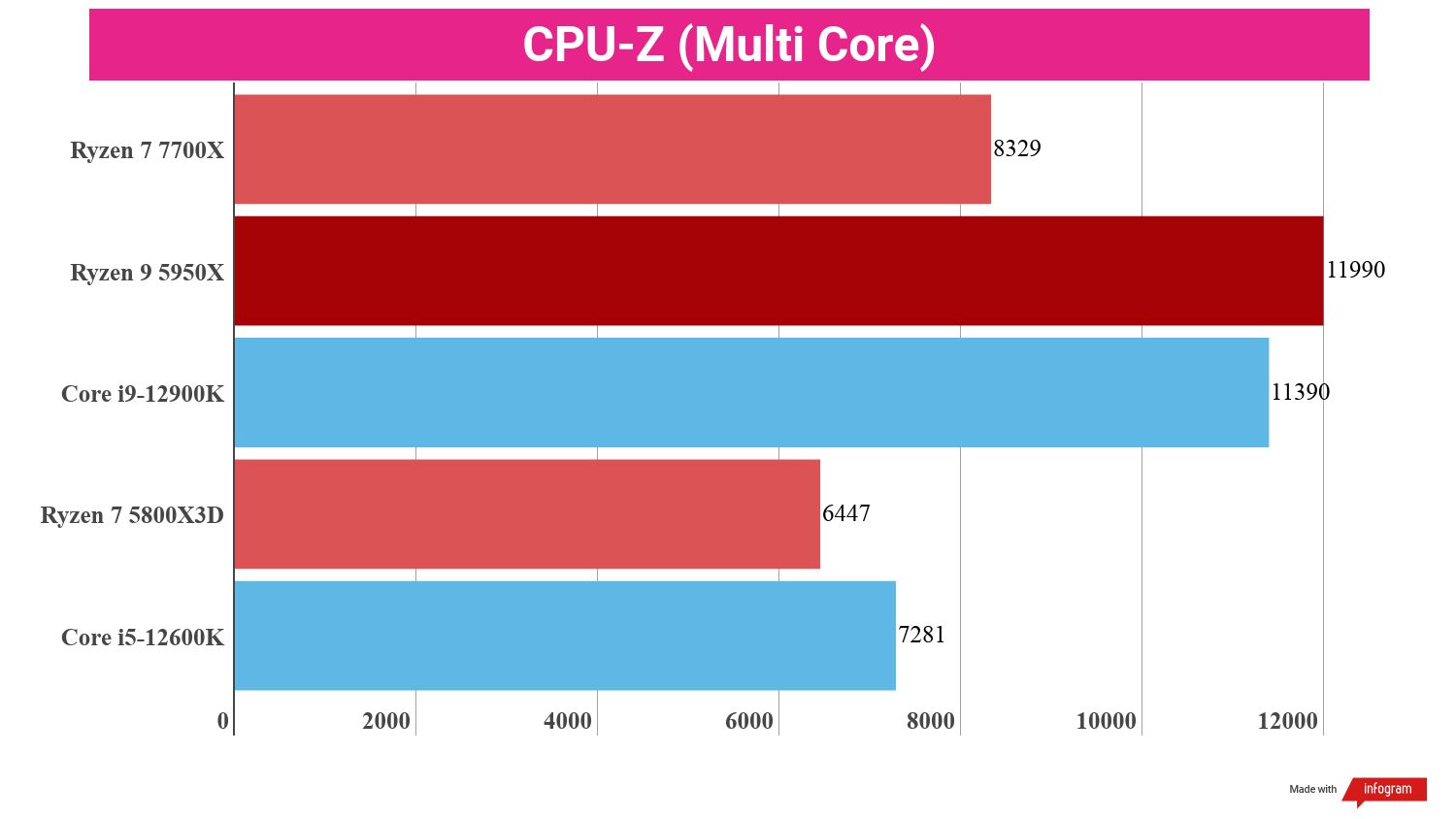
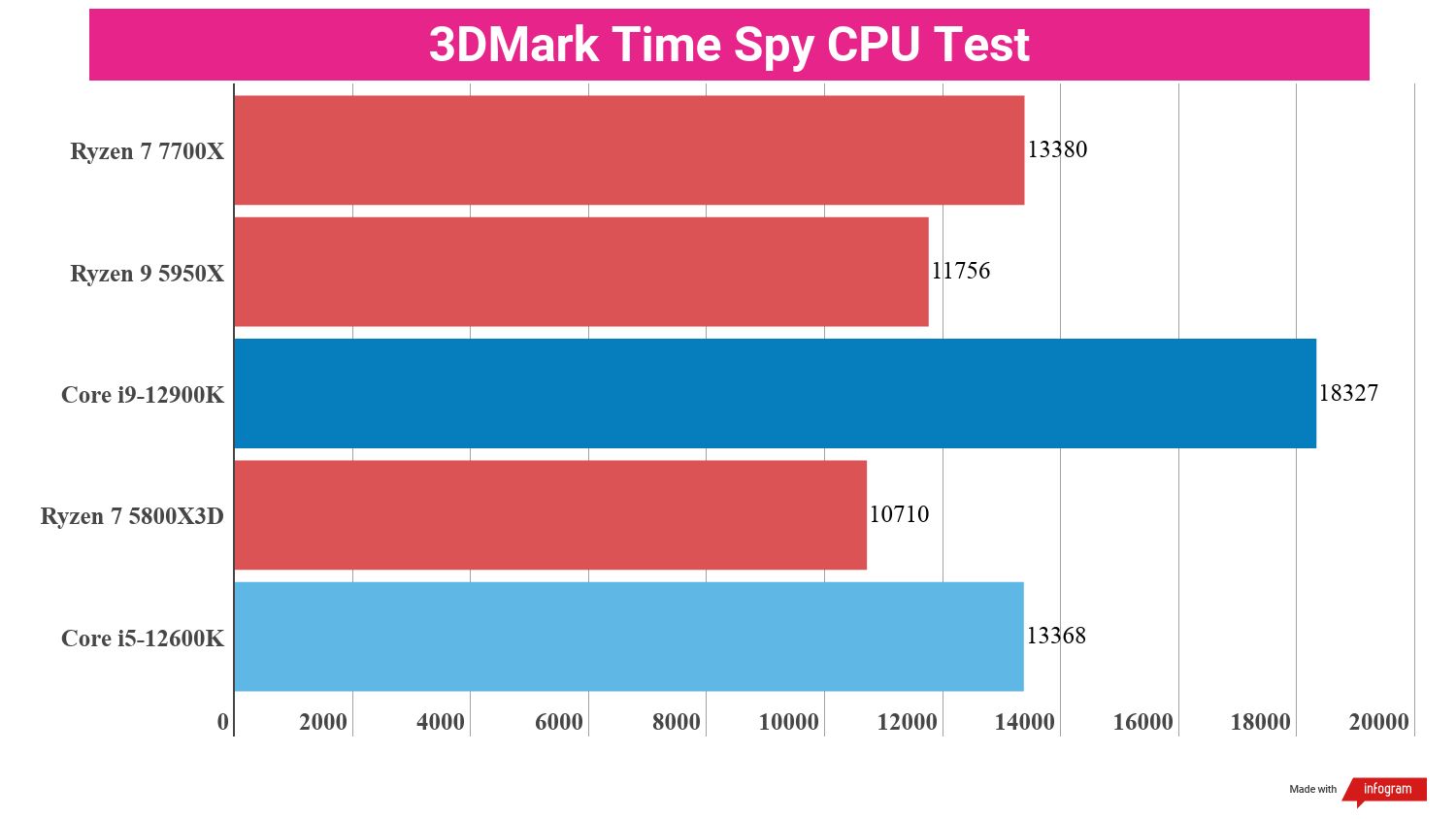
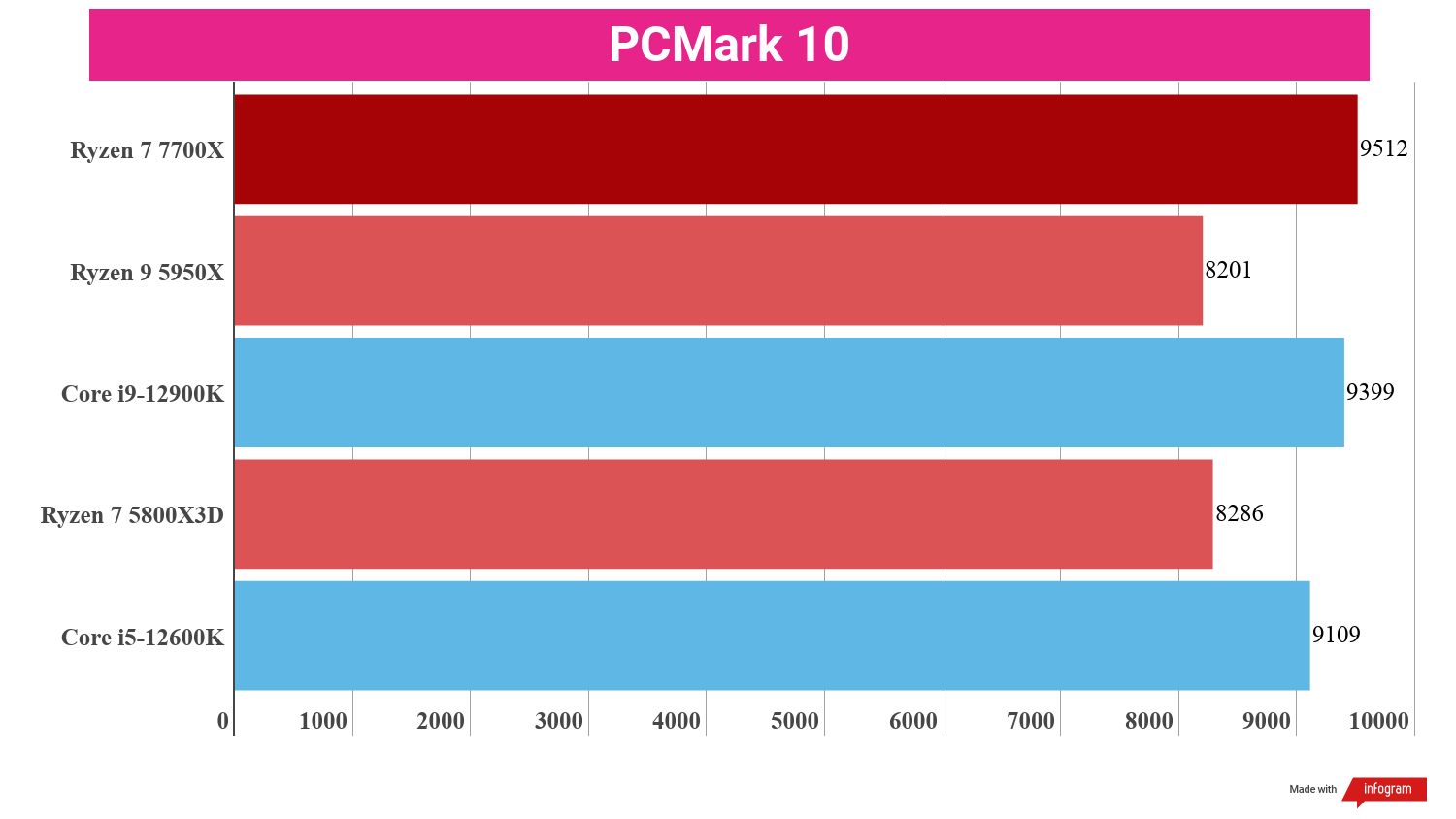
On synthetic benchmarks, the Ryzen 7 7700X's single core performance pulls slightly ahead of the Core i9-12900K on average, and averages about a 27% increase in single-core performance over the Ryzen 7 5800X, and a just over 33% increase in multi-core performance. In terms of general computing performance as measured by PCMark 10, edges out the Core i9-12900K (9,512 to 9,399), and handily beats the Ryzen 7 5800X (9,512 to 8,305) for a 14% better performance, on average.
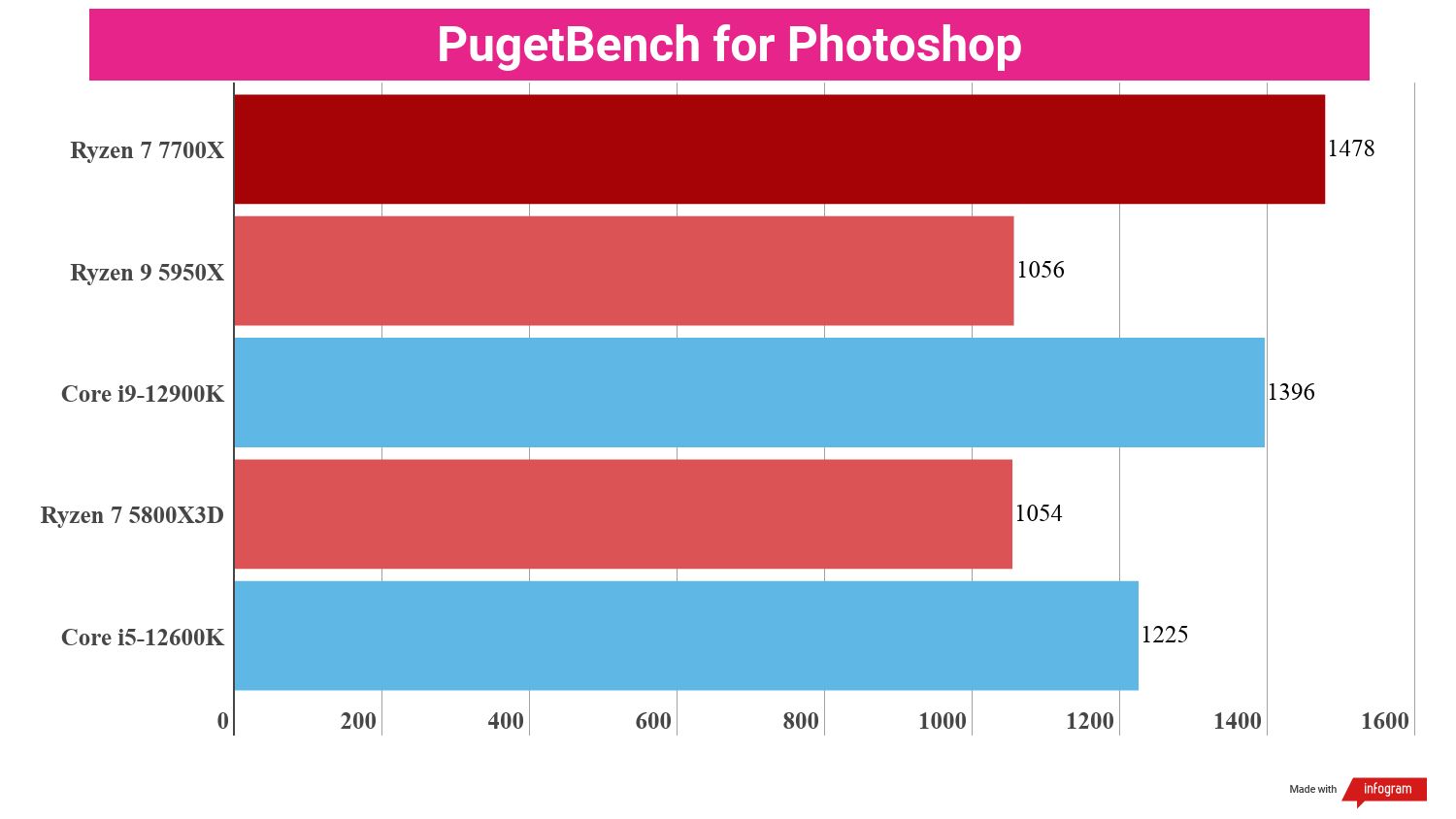
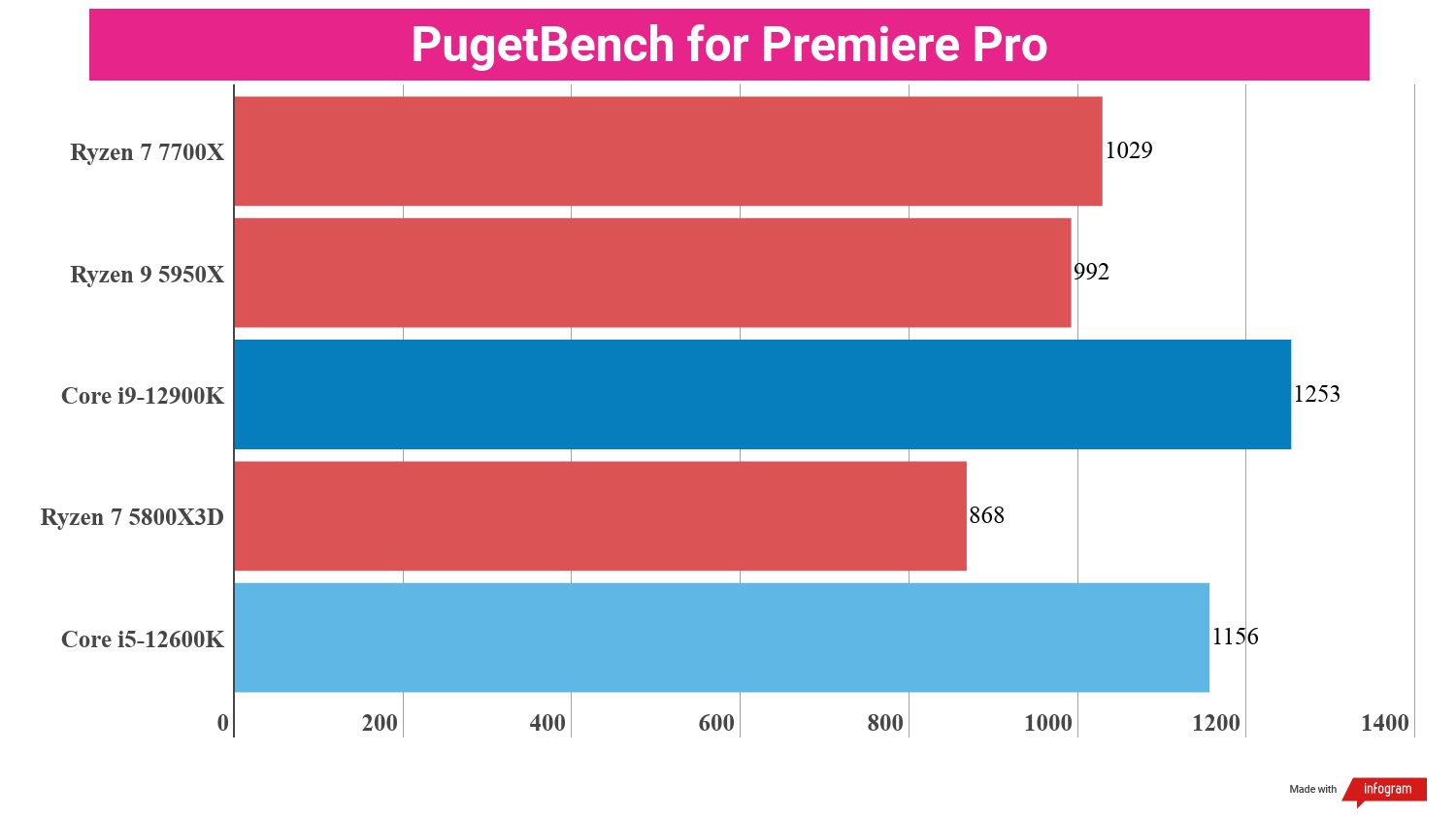
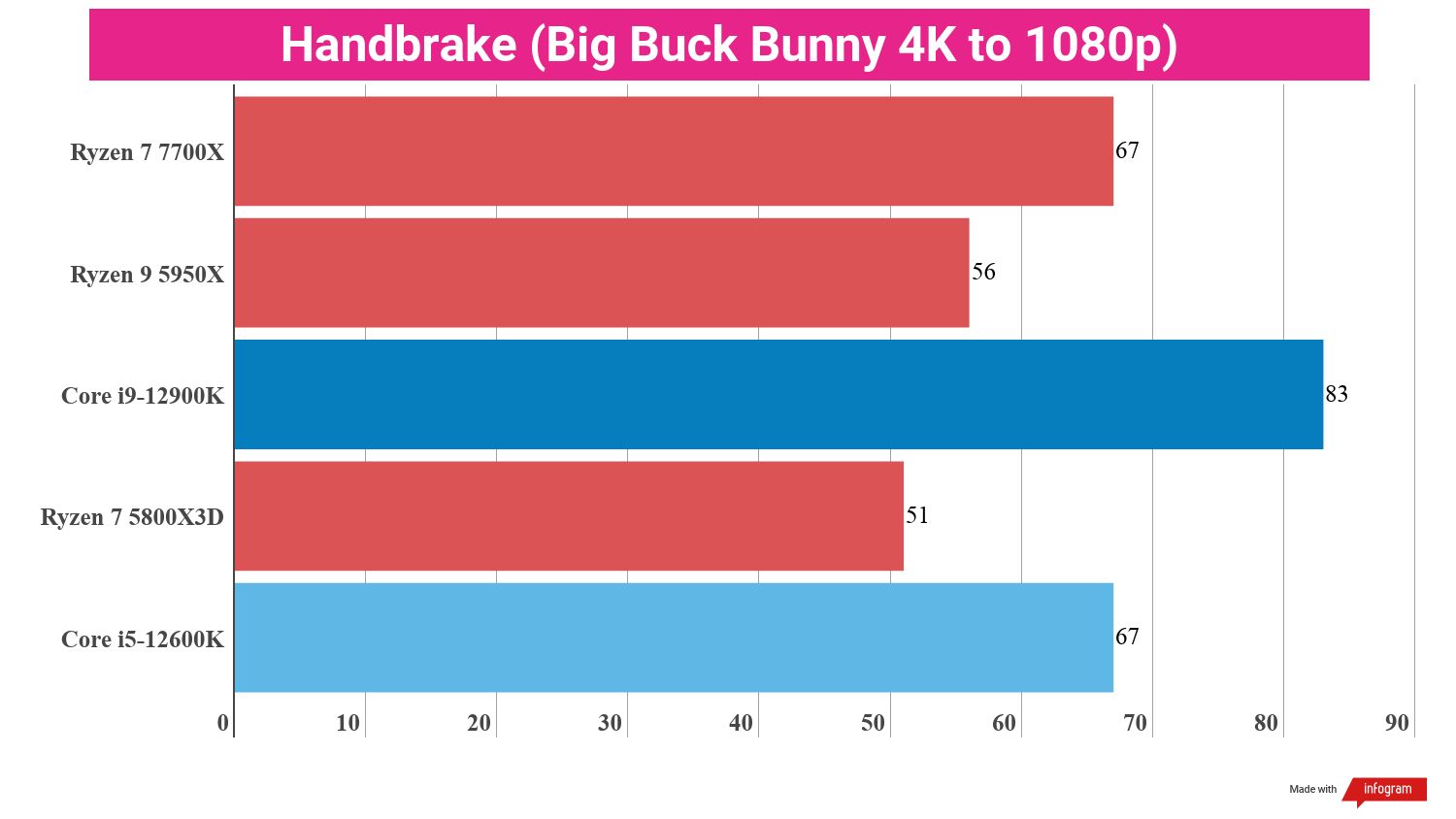
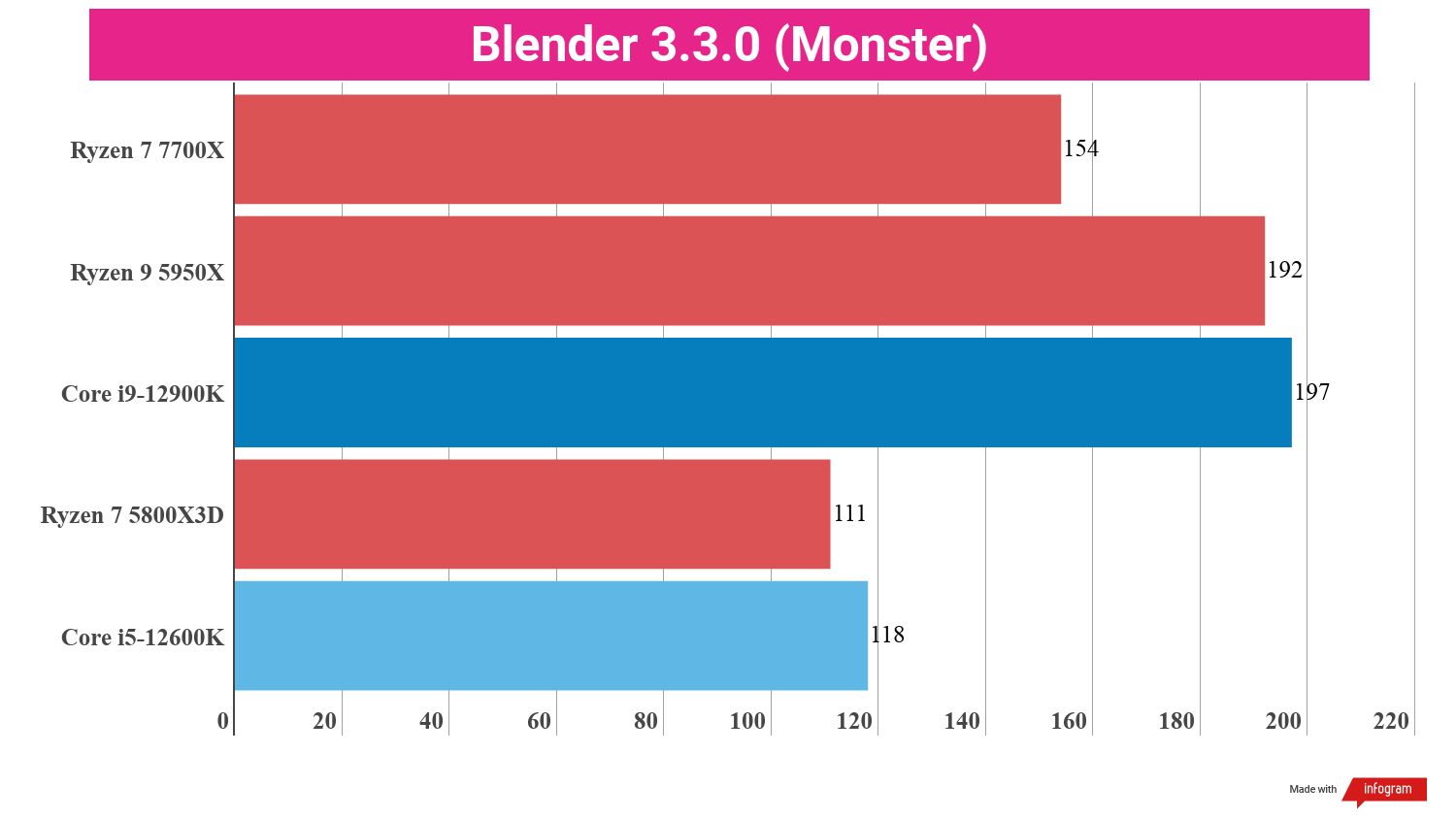
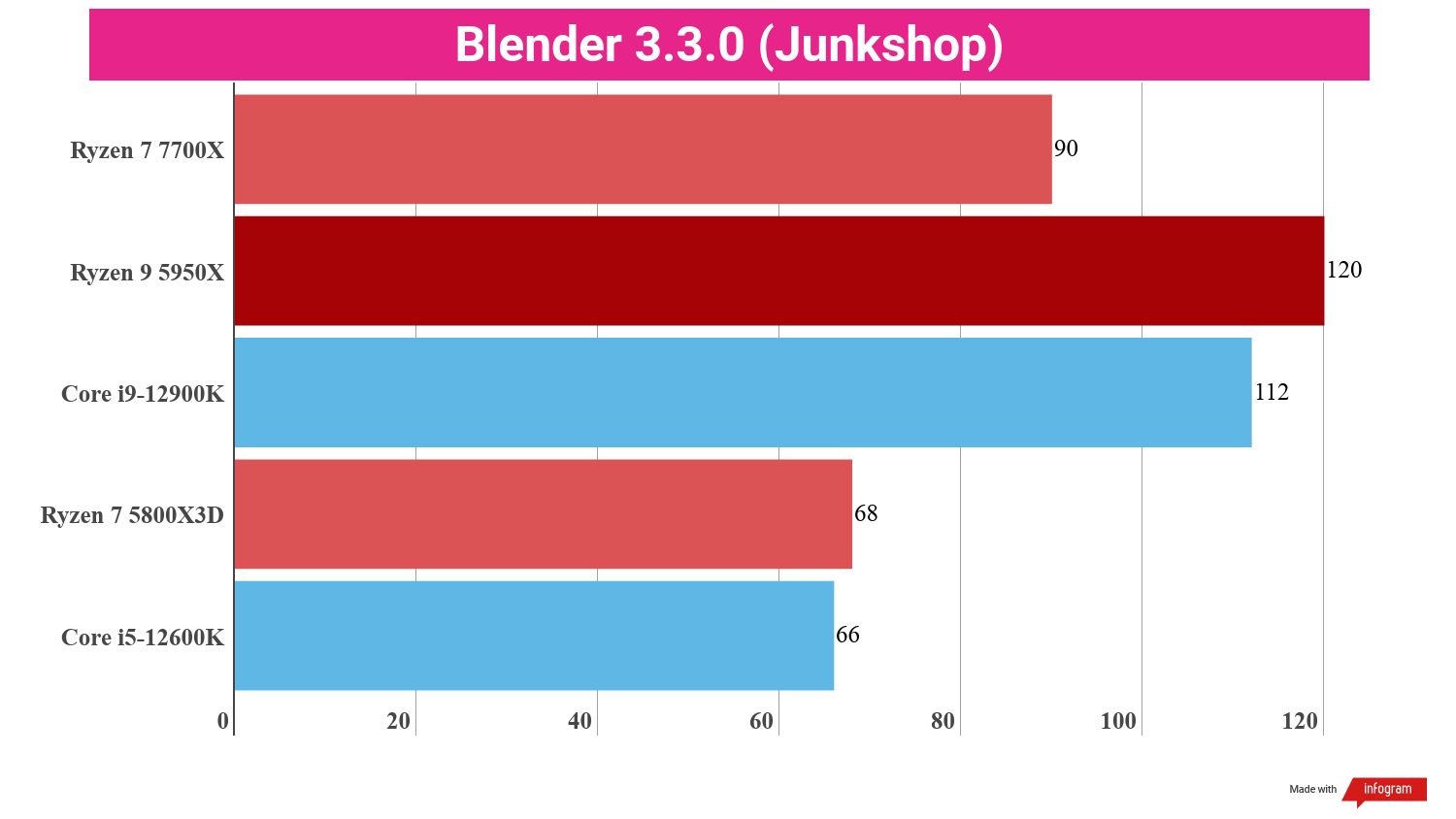
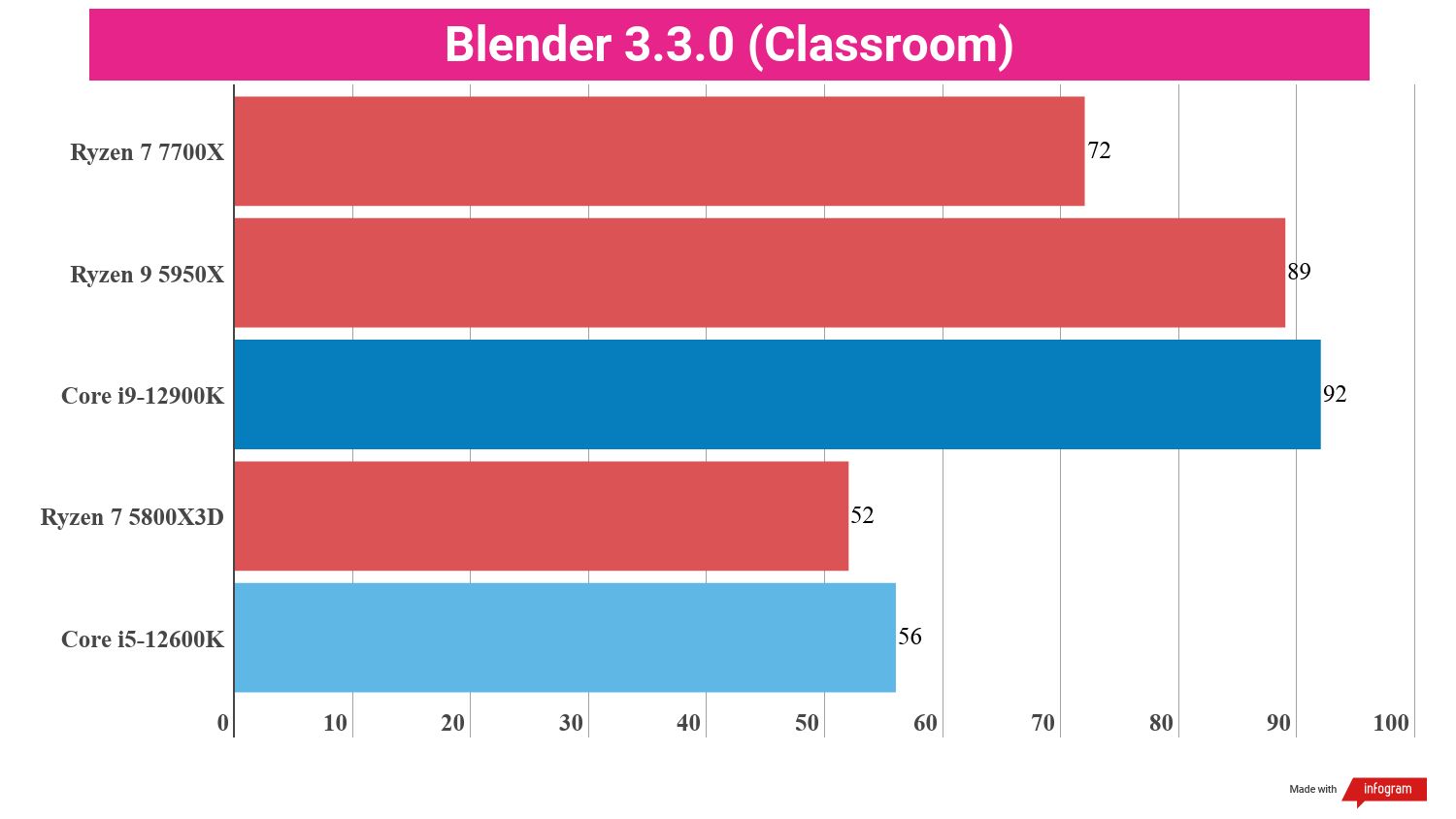
When it comes to content creation, multicore performance really is king, and this is arguably the Ryzen 7 7700X's "weakest" category. When it comes to video editing and encoding as well as 3D rendering, the Core i9-12900K pretty much takes the crown in every test, coming in second to the Ryzen 9 5950X in Blender 3.3.0's Junkshop rendering test, (112 to 120, respectively). The Ryzen 7 7700X comes in a respectable third with a score of 90, however, well ahead of the Ryzen 7 5800X3D (68) and the Core i5-12600K (66).
The Ryzen 7 7700X does score at least one win though, and by a pretty wide margin. It does very well with PugetBench for Photoshop, scoring a 1,478 to the Core i9-12900K's 1,396. Only the Ryzen 9 7950X scored better in our tests (1,487), and honestly that is well within the margin of error to consider it a tie, in our opinion.
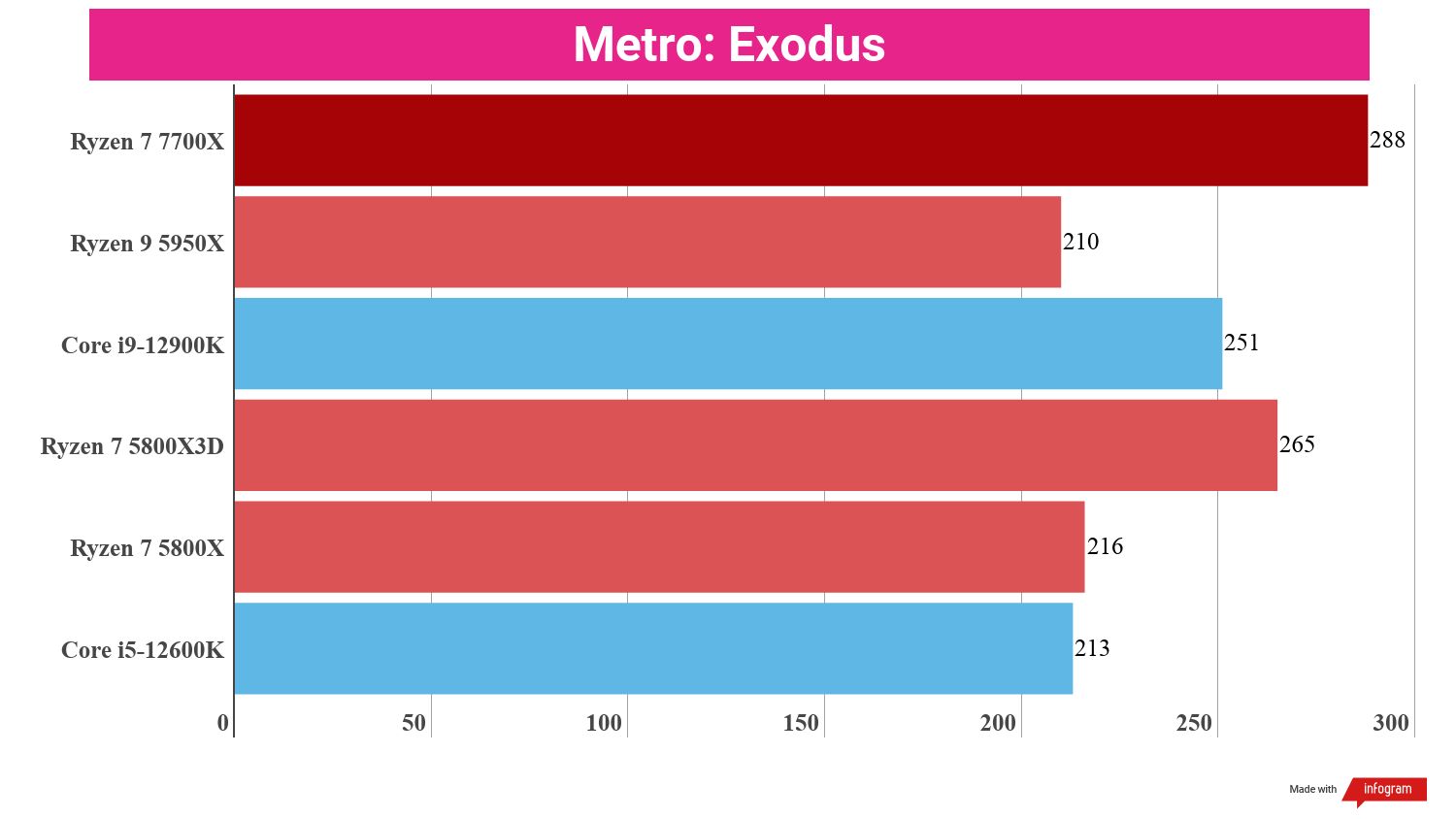
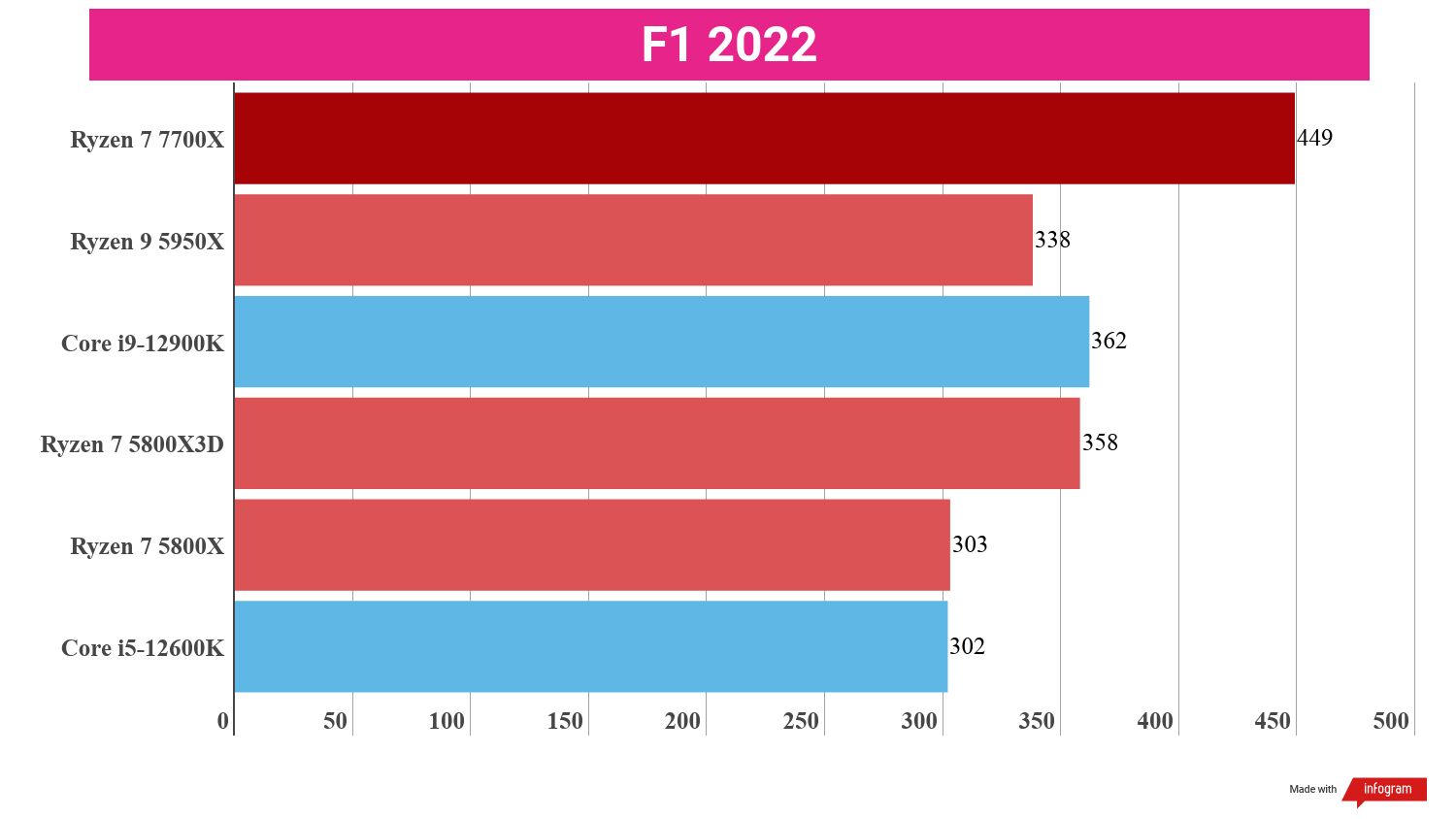
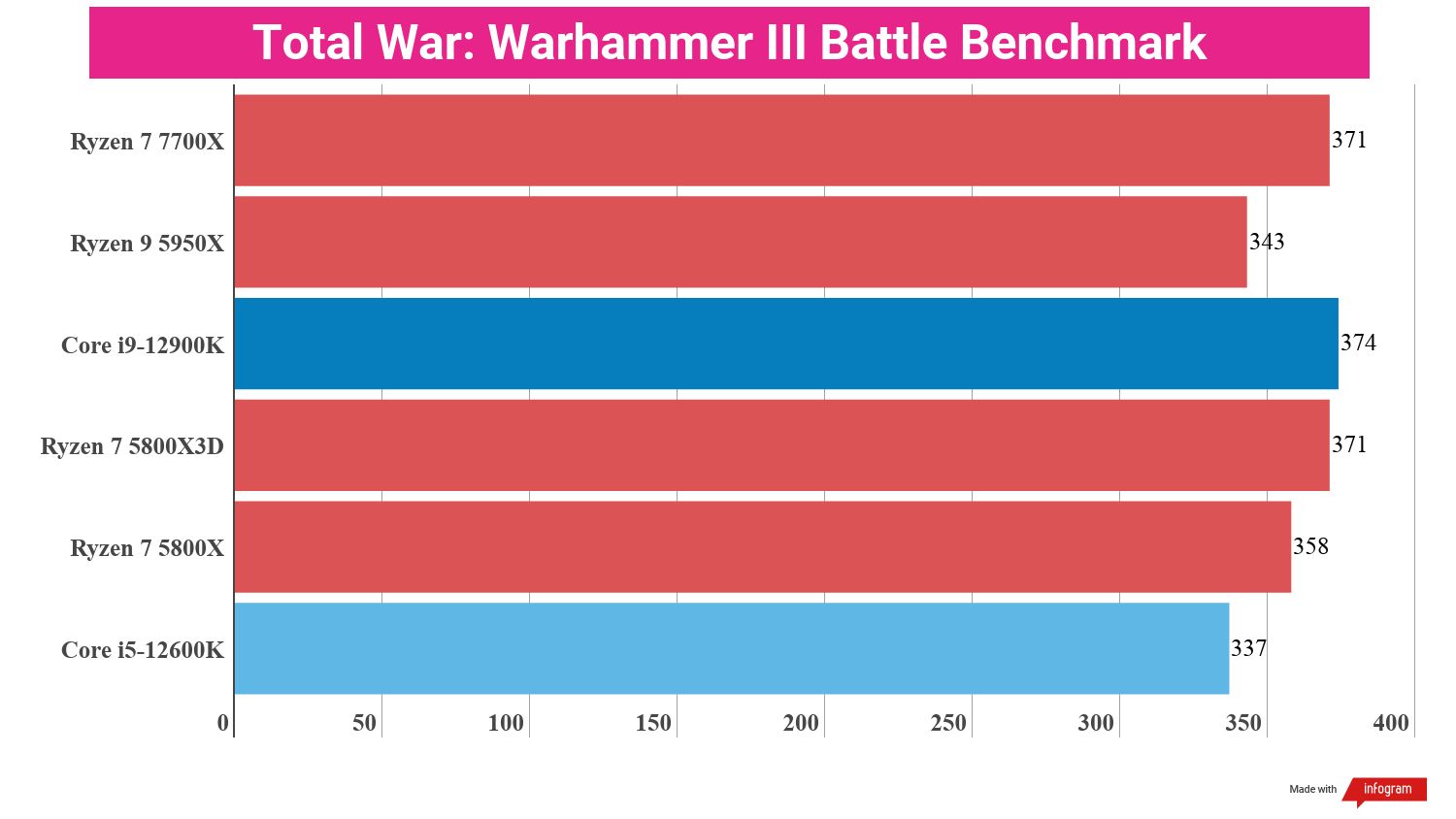
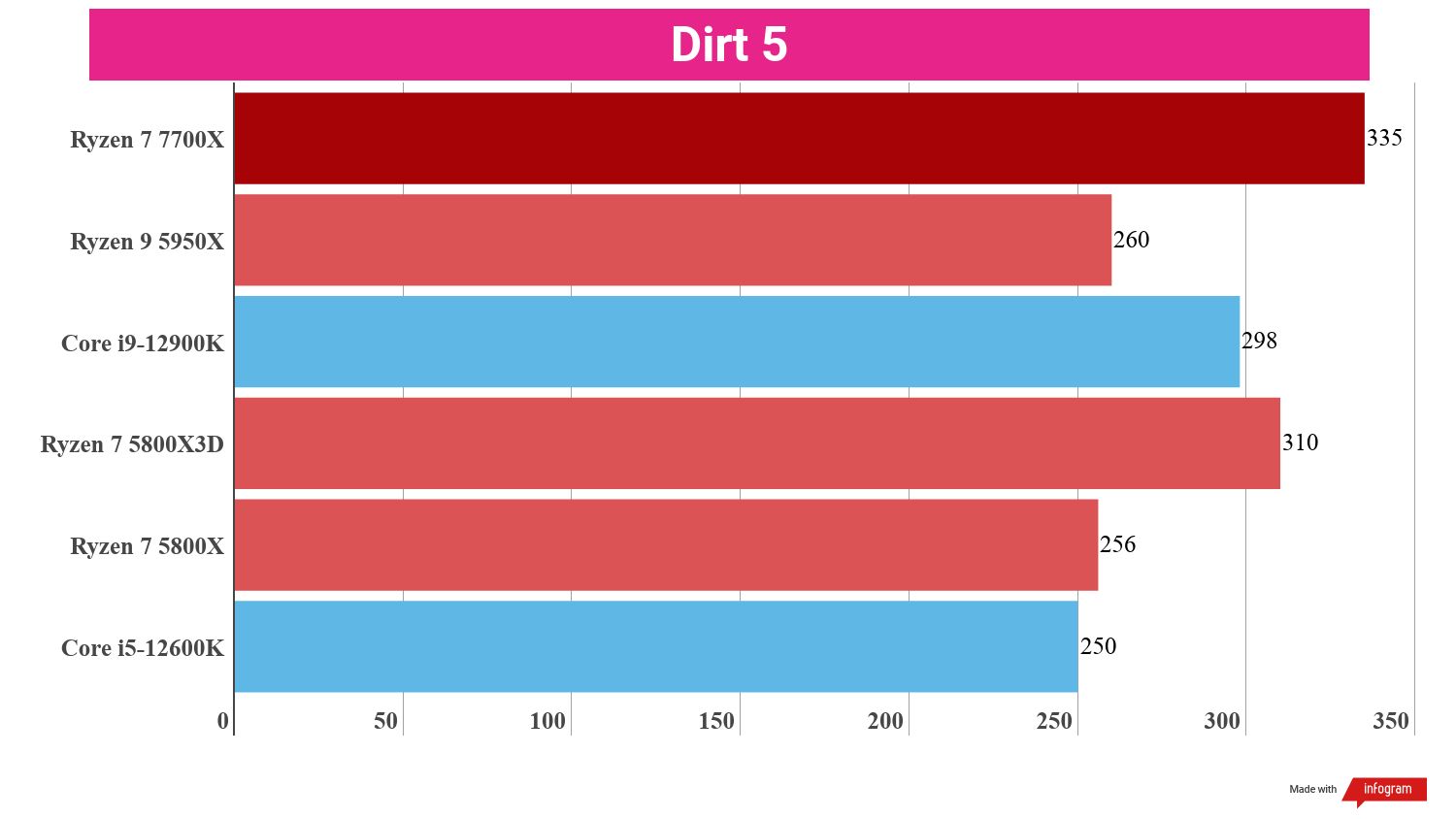
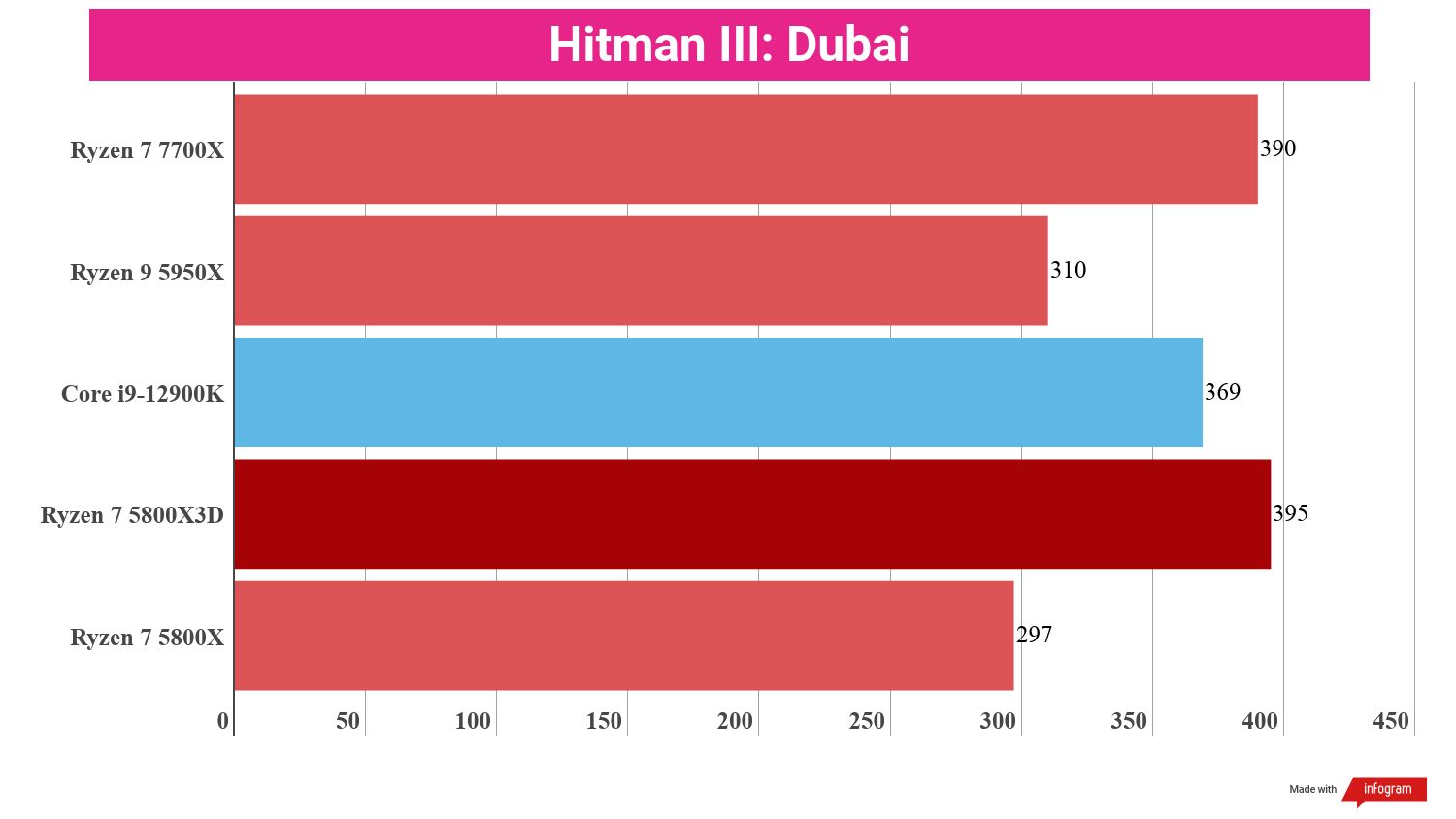
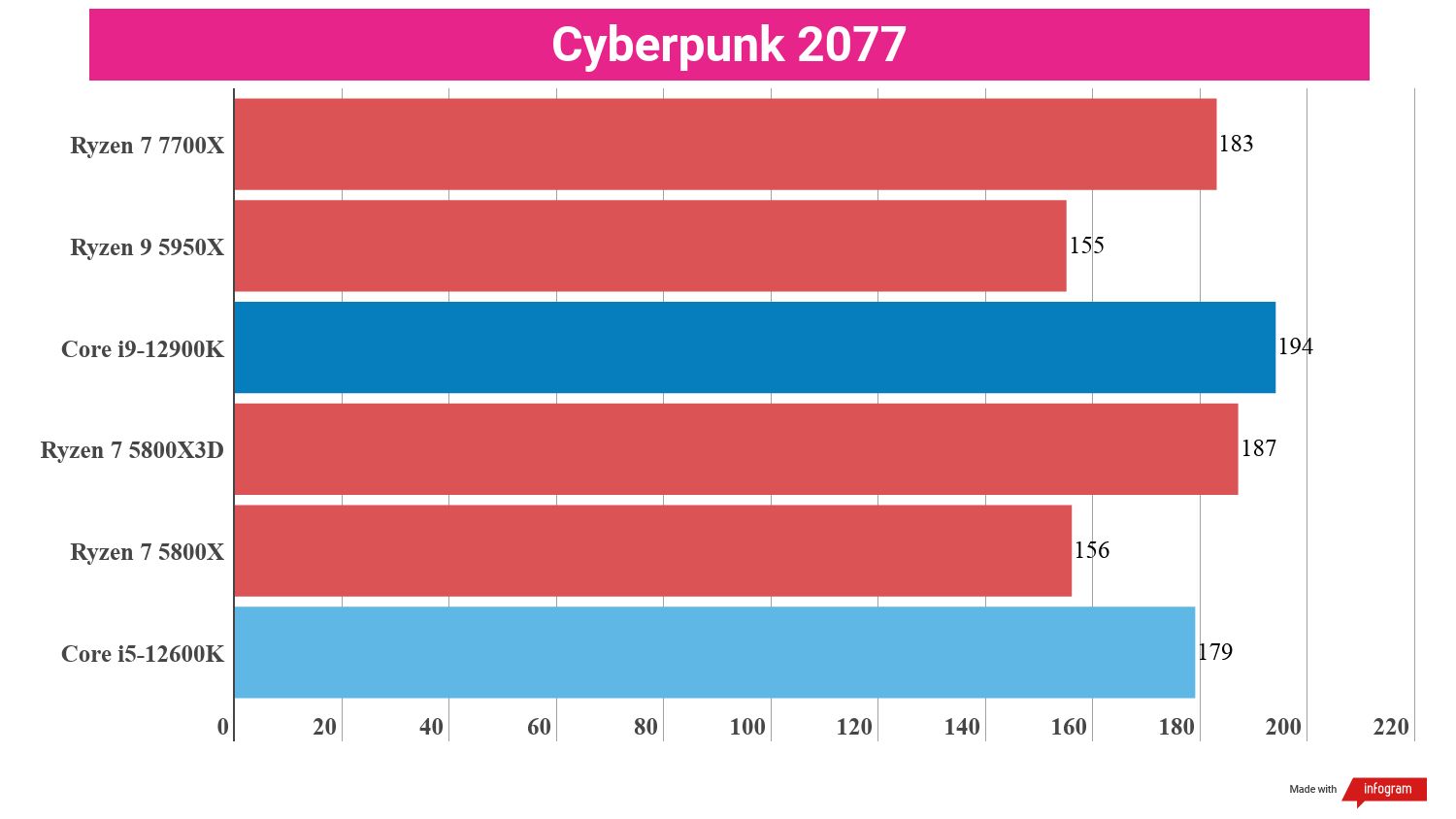
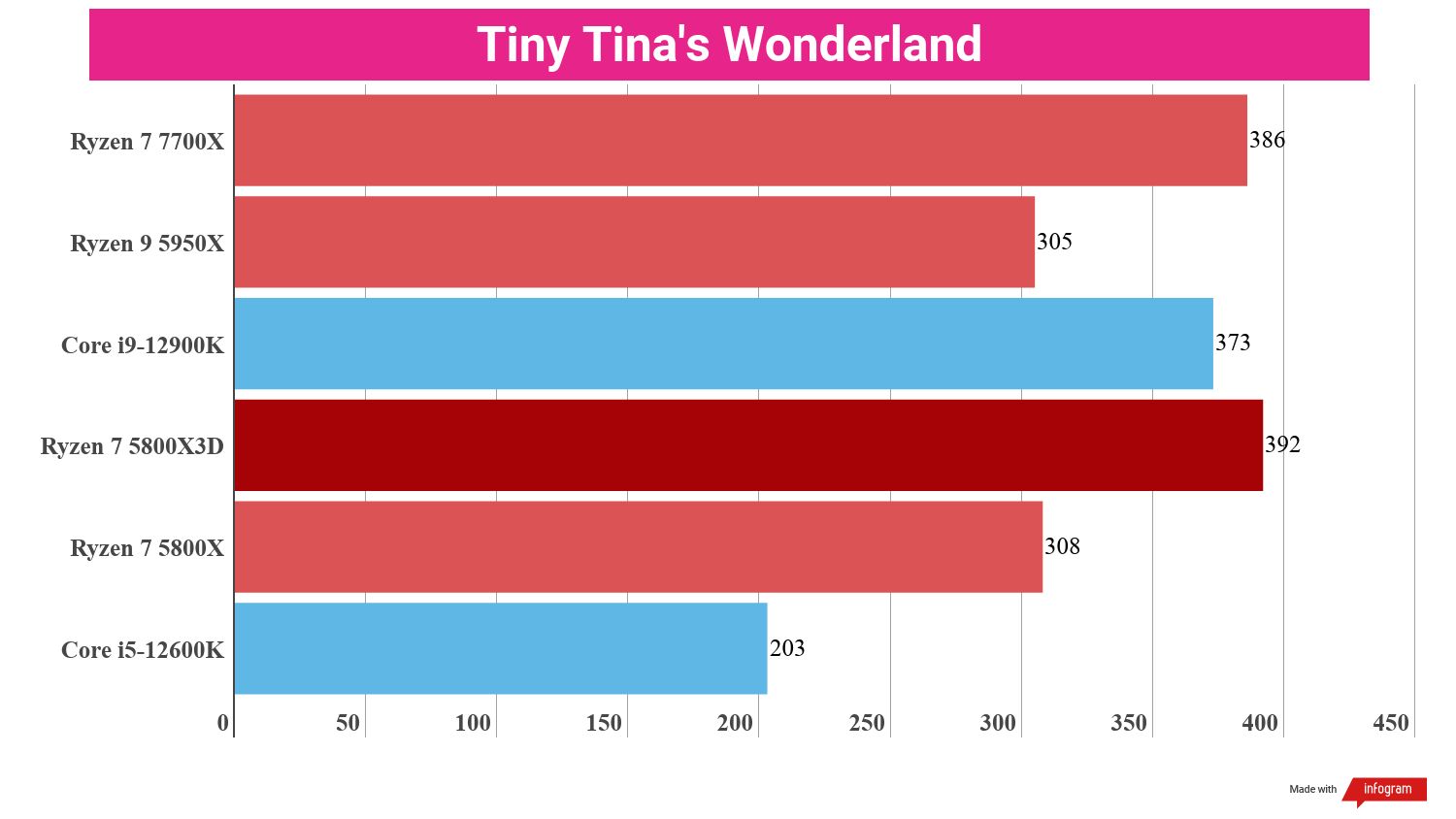
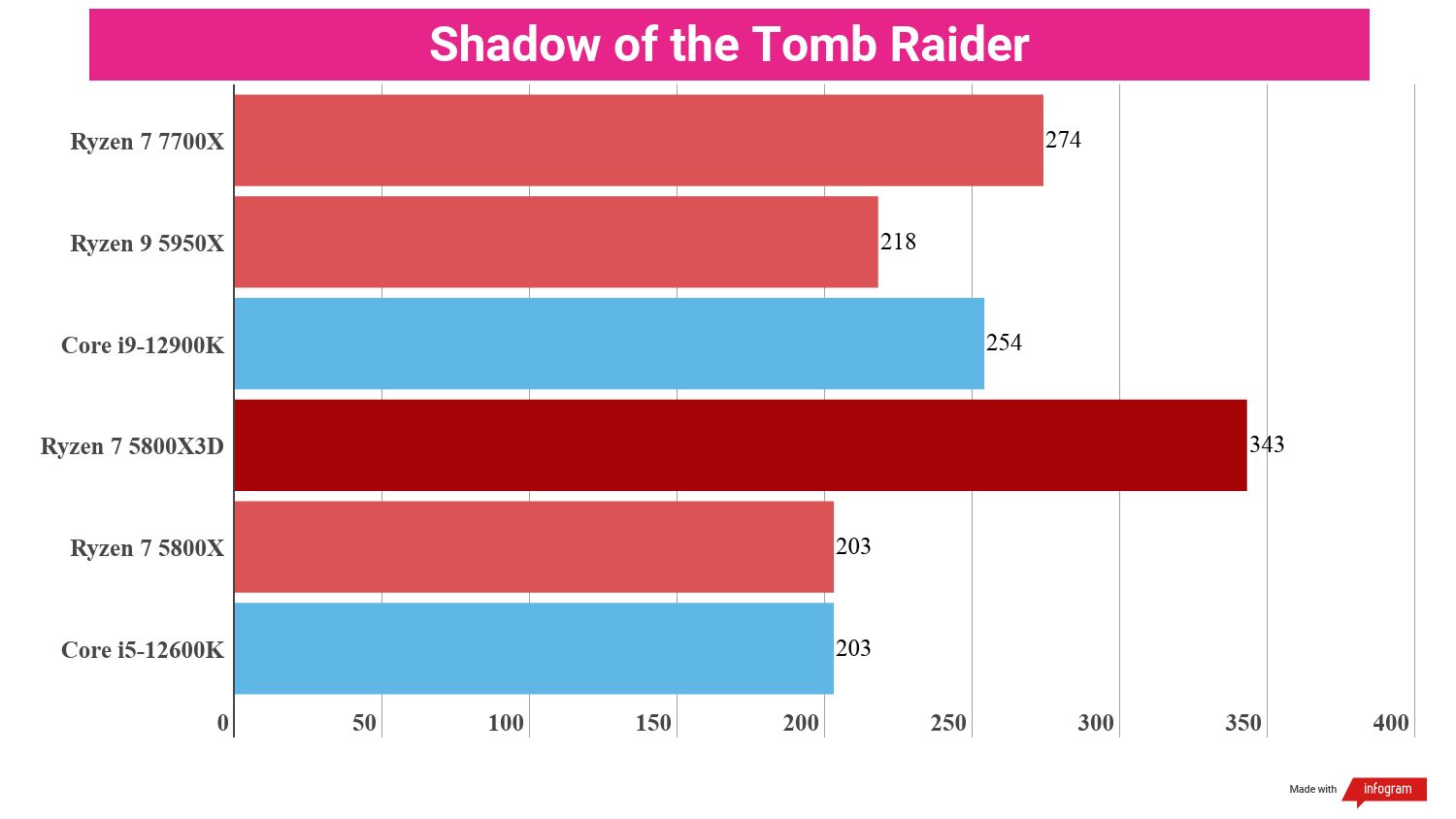
In terms of gaming, we tested the Ryzen 7 7700X against competing chips using a standard 1080p game resolution, with the lowest graphics settings possible using an RTX 3090 graphics card to remove any potential GPU performance bottlenecks to isolate the CPU performance during our gaming benchmarks.
Consistently, the Ryzen 7 7700X went toe-to-toe with the Ryzen 7 5800X3D, which has substantially more L3 cache which dramatically speeds up CPU gaming performance. Which one came out the FPS winner depends on the game, but on average, the Ryzen 7 7700X edges out every other chip we tested, with the Core i9-12900K taking the win in Cyberpunk 2077 and Total War: Warhammer III, but even then it was very close.
The most notable thing about the performance of the Ryzen 7 7700X is how it manages to perform as well as it does against chips with the same or higher TDP. Over our entire testing session with the 7700X, it maxed out its power draw at 121.222W and more or less matched the performance of the Ryzen 9 5950X, which needed 144.895W at its peak.
Worse still is the Core i9-12900K, which did outperform the Ryzen 7 7700X by about 18% overall, but its max power draw was 251.61W, or more than double the Ryzen 7 7700X's peak power usage.
The long and short of it is that even though the 7700X is fighting more powerful processors to a draw or at least putting up a good fight in defeat, it is expending much less energy to do so.
- Performance: 5 / 5
Should you buy the AMD Ryzen 7 7700X?
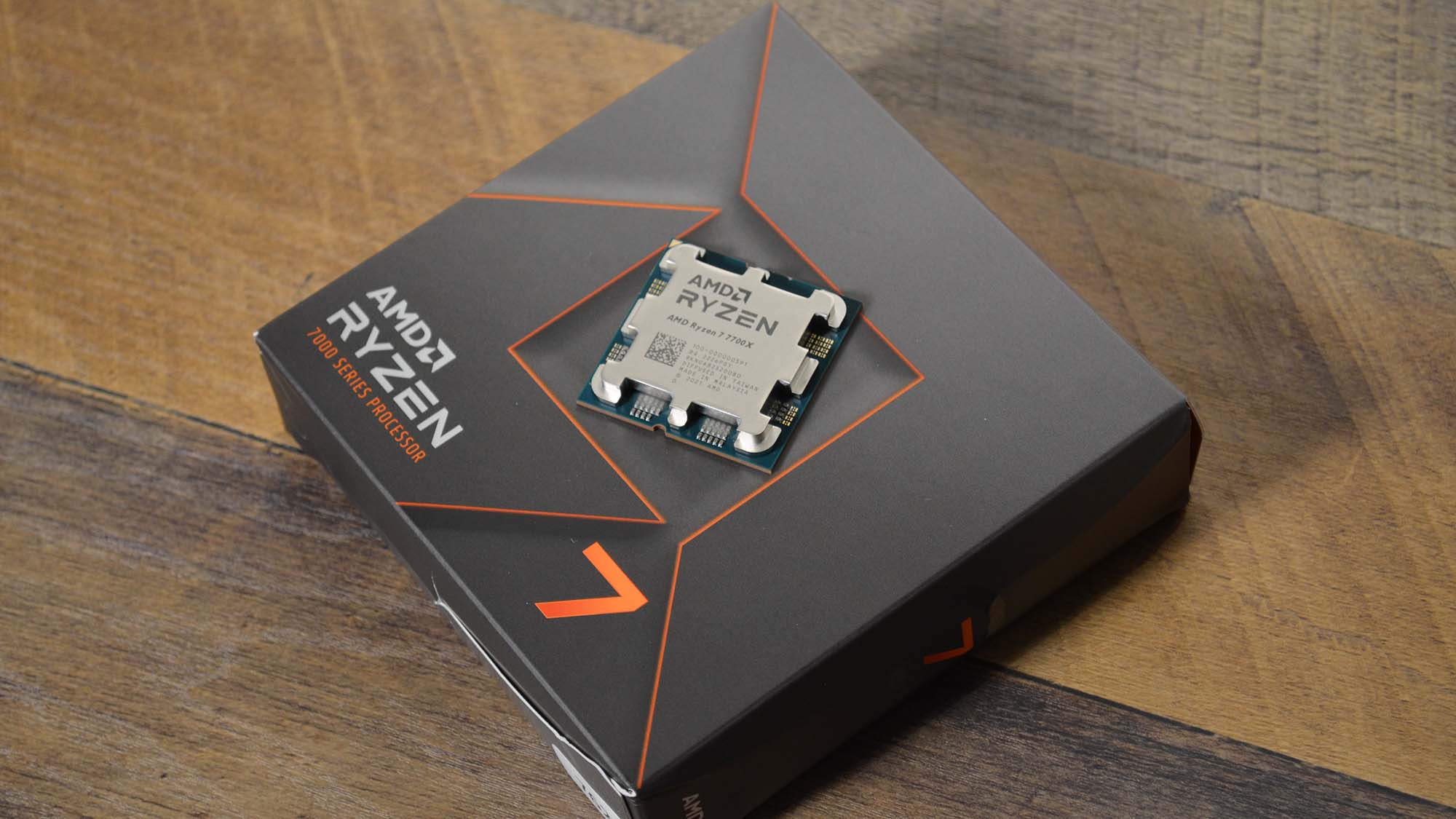
Buy it if...
You want one of the best gaming processors around
The AMD Ryzen 7 7700X is the best gaming processor we've tested, on average. More chips are on the way, but for right now, this one takes the crown.
You want great performance for your money
The value proposition of the Ryzen 7 7700X is undeniable, and though it's entry price is more midrange than budget, it is well worth stretching your budget a bit if you can.
You want an integrated GPU
The Ryzen 7 7700X comes with a dual-core RDNA 2 GPU built in, so you don't need a discrete graphics card, which is great for general business purposes.
Don't buy it if...
You need best-in-class content creation performance
While this chip is great for just about everything, content creation performance is respectable, but there are better chips for that kind of work.
You're on a tight budget
The Ryzen 7 7700X is going to require a new motherboard and DDR5 RAM to use, so if you don't already have an AM5 board and DDR5 RAM handy, this might be a much more expensive upgrade than its MSRP lets on.
Also Consider
AMD Ryzen 7 5800X3D
If you're looking for the best gaming processor that doesn't require you to upgrade your motherboard and RAM to use, the Ryzen 7 5800X3D is still the best gaming CPU for the AM4 socket.
Read more: AMD Ryzen 7 5800X3D review
AMD Ryzen 9 7950X
If money is no object or you're at least willing to spend the extra $300, the Ryzen 9 7950X is easily the best processor to hit the consumer market in terms of raw performance, but it's definitely for the enthusiasts out there rather than the "value" shoppers.
Read more: AMD Ryzen 9 7950X review
Intel Core i9-12900K
If you're looking for the best processor for content creation, you're going to be hard pressed to find better than the Core i9-12900K. It's expensive, sure, but this is the processor you're going to want for video editing, rendering, and the like.
Read more: Intel Core i9-12900K review
AMD Ryzen 7 7700X Final Report Card
| Value | At $399, it's cheaper than its predecessor on paper, but unless you have an AM5 motherboard and DDR5 RAM kit handy, this can be a costly upgrade. | 4.5 / 5 |
| Features | The introduction of PCIe 5.0 and DDR5 is a welcome addition, as is TSMC's 5nm process, but the lack of DDR4 support is a slight ding on an otherwise fantastic design. | 4.5 / 5 |
| Performance | Across the board, this processor can more than hold it's own against Intel's best, and it can even outperform it when it comes to general everyday use and gaming. And while it's content creation chops fall short of AMD and Intel's 16-core beasts, this is a fantastic compromise for content creators on a budget. | 5 / 5 |
| Final score (average) | As a pure value proposition, the AMD Ryzen 7 7700X is probably the only processor most people outside of professional video production teams and PC enthusiasts will need for at least another decade. | 4.67 / 5 |
- First reviewed September 2022
How we test processors
When it comes to processors, we look at four key metrics: synthetic single and multi-core performance, "general" performance, creative performance, and gaming performance.
- Synthetic single and multi-core benchmarks test the performance of specific instruction sets and processor operations like floating-point calculations using benchmark tools like GeekBench, Cinebench, and CPU-Z.
- General performance is how the processor performs during typical use conditions using PCMark 10.
- Creative performance is a measure of how well the processor performs in several popular creative workloads like Handbrake, Blender, and Adobe Photoshop. Where possible, we explicitly disable GPU accelerated operations or test rendering using the CPU by itself.
- Gaming performance measures how well the processor calculates gaming operations like in-game physics by running several games' integrated benchmark tools like CyberPunk 2077, Metro: Exodus, and F1 2022. In all cases, we run the benchmarks on the lowest graphics settings available at 1080p and using the most powerful graphics card we have available and with 32GB RAM to isolate the actual CPU operations we are testing without having to worry about inteference with excessive memory or graphics management.
Once this is done, we average the scores across each category for a final report card broken down by use case, and then we finally divide these scores by the processor's MSRP to measure its performance-for-price to determine how good of a overall value the processor is for the average consumer.

John (He/Him) is the Components Editor here at TechRadar and he is also a programmer, gamer, activist, and Brooklyn College alum currently living in Brooklyn, NY.
Named by the CTA as a CES 2020 Media Trailblazer for his science and technology reporting, John specializes in all areas of computer science, including industry news, hardware reviews, PC gaming, as well as general science writing and the social impact of the tech industry.
You can find him online on Bluesky @johnloeffler.bsky.social
